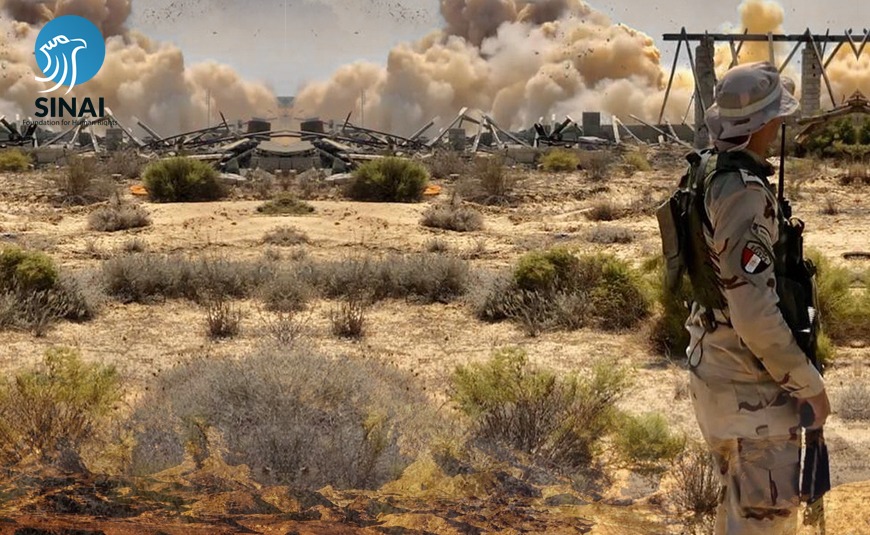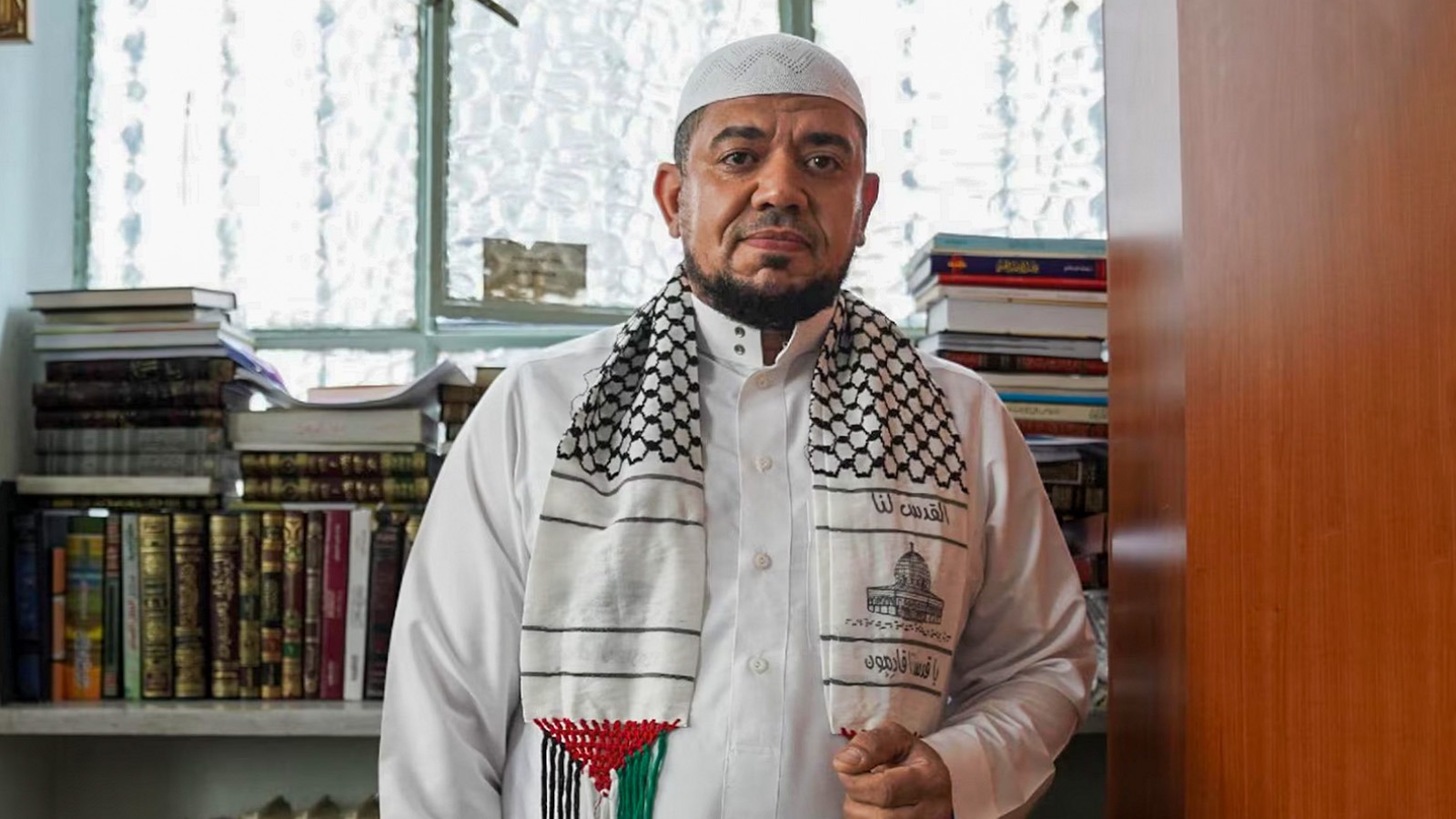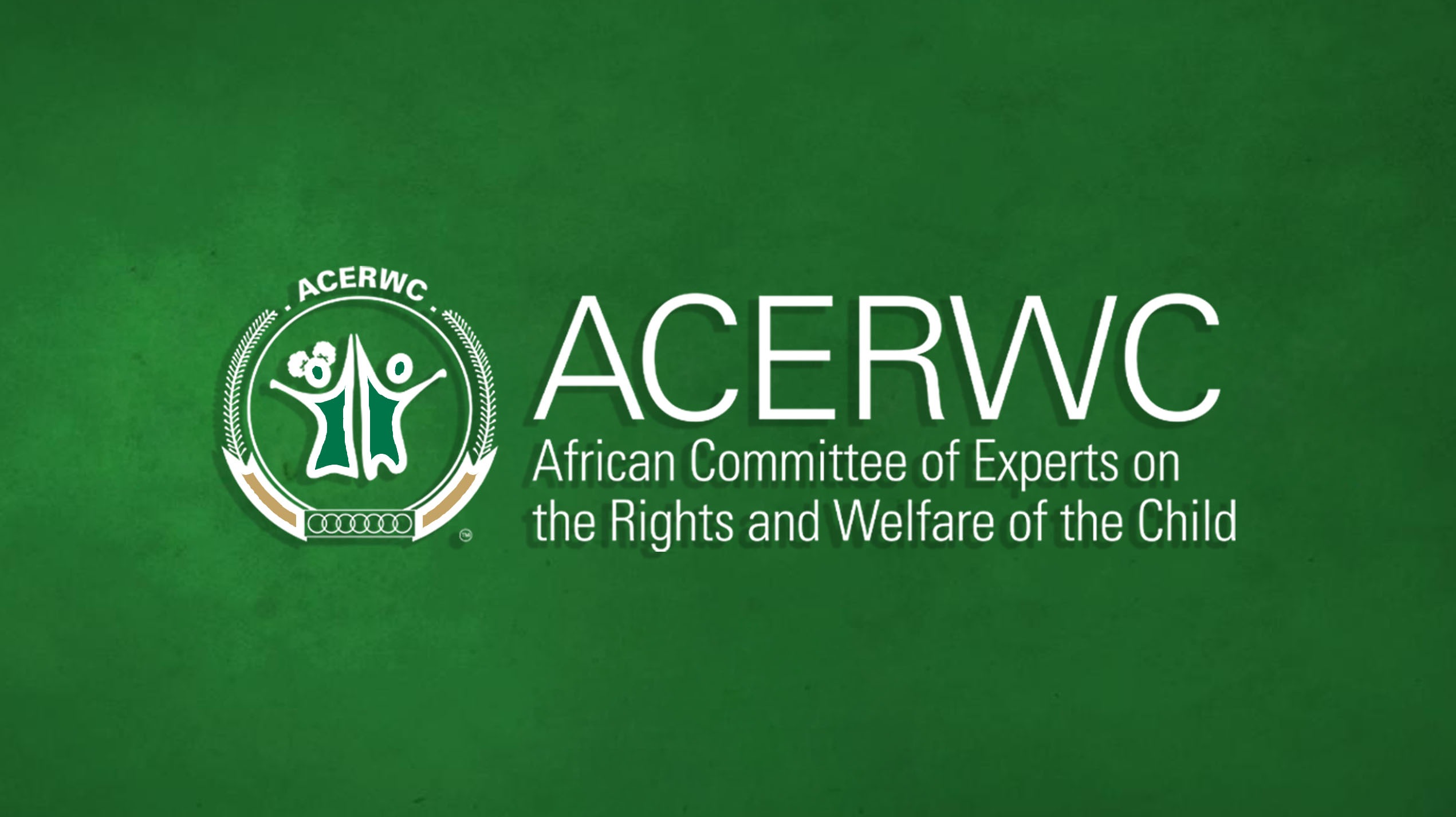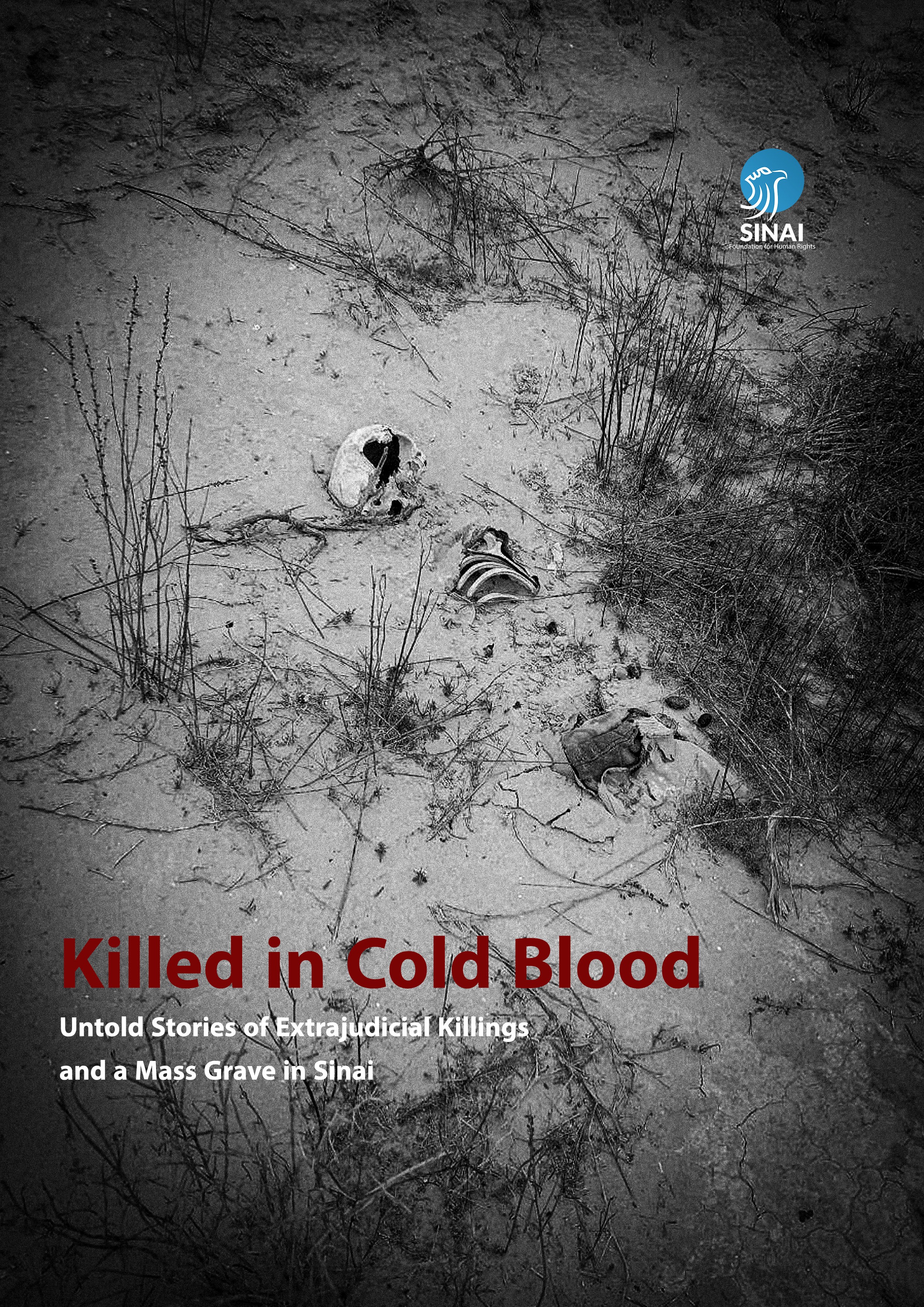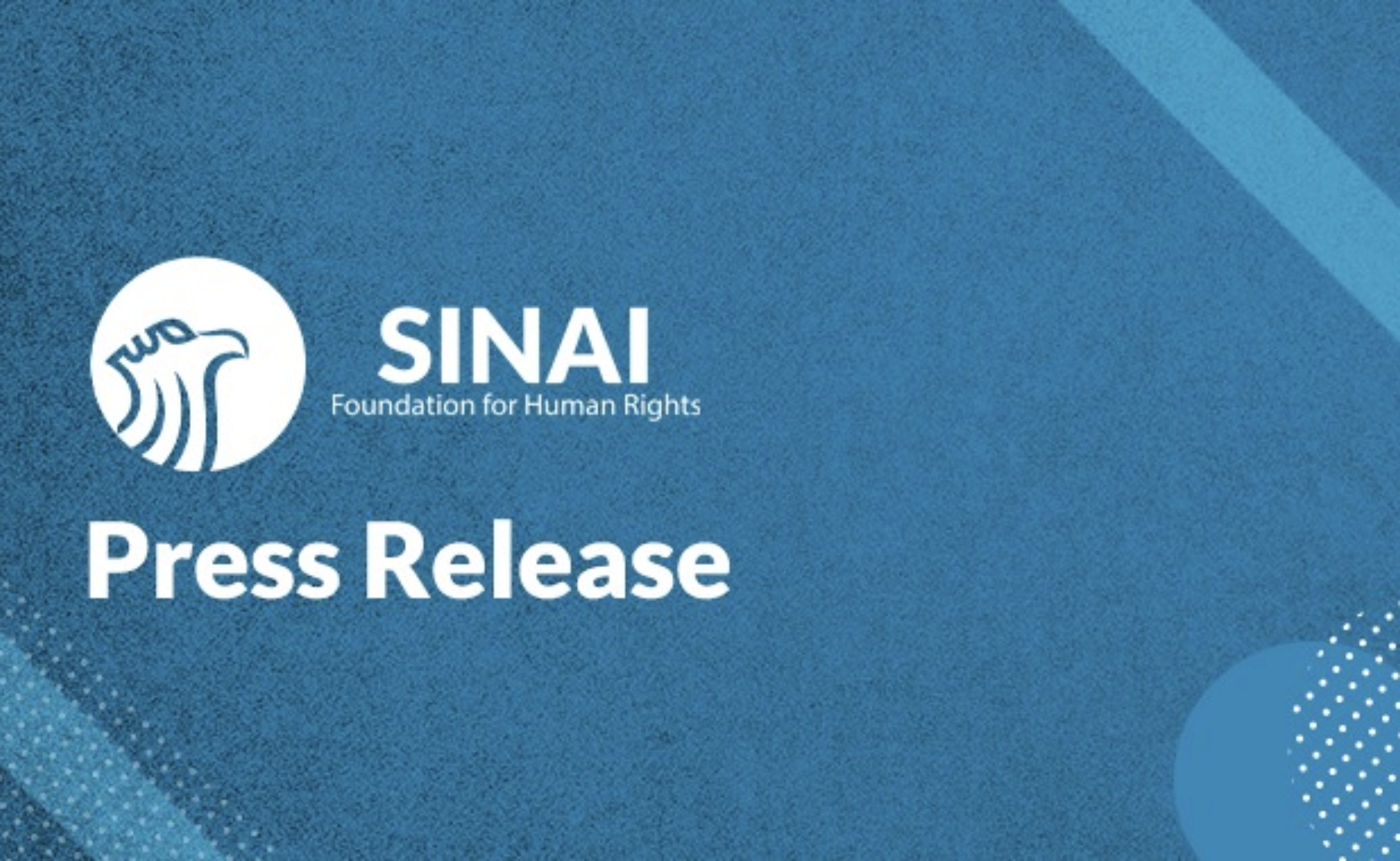-July, August, September-
Summary
Civilians are the weakest link in the ongoing conflict in the Sinai Peninsula between the Armed Forces and the Egyptian police force on one side, and extremist Islamist armed groups on another. The conflict levels have been on a steady rise since former President Mohamed Morsy was ousted in 2013, and things have gotten much worse in late 2014 when armed groups in Sinai united and pledged their allegiance to ISIS, and formed a group called Wilayat Sina’, or Sinai Province. Almost no day goes by without a violation with the locals as its victims.
During the time period the report is covering, “Sinai Foundation for Human Rights” has documented 35 abuses by the active parties in Sinai, with the Egyptian Armed Forces committing the most abuse with 26 abuses, followed by ISIS with eight abuses, then pro-government irregular armed groups with one violation.
These abuses were geographically concentrated in “Bir al-Abd” with a count of 19 abuses, followed by “al-Sheikh Zuwayed” with 12 abuses, then “al-Arish” and “Rafah” with two abuses each. The foundation has also documented the murder of 10 people, among which is four children and one woman, and the injury of 16 others, among which is six children and two women.
Over the course of three months, the “Sinai Foundation” has kept up with all the abuses in the area, and they were all counted and documented by the “Sinai Foundation” field team. This report’s methodology basically depends on eyewitness accounts collected through interviews, field visits, and phone calls with 64 local citizens and victims’ relatives or people with direct relationships to them, activists, local journalists, and a number of government officials, and we collected accurate data from medical sources from the hospitals affected by some of those abuses.
This report shows, through a series of testimonies and abuses, how the conflicting parties did not take the civilians into account, and in some cases, purposely used them or violated their rights which is common in Sinai. The report points to the fact that the alternating attacks between the Egyptian government forces and the Sinai Province group turn the region into an ongoing long-term conflict zone that leads to many abuses, some of which could be considered war crimes and crimes against humanity, which relative laws and treaties consider as imprescriptible, and the affected could at any time sue those who caused them.
It is important to say, that most of the abuses that take place in Sinai are not recorded in the country’s official records, or are inaccurately recorded in a way that reduces the chance of the victims’ ability to try to claim their rights, as the Egyptian law enforcement forces mostly do not admit to the fact that there are victims of their operations. And the administrative and medical records and the security authorities record the casualties caused by those operations as results of unknown reasons, which protects the responsible authorities from any accountability or compensations due to the victims.
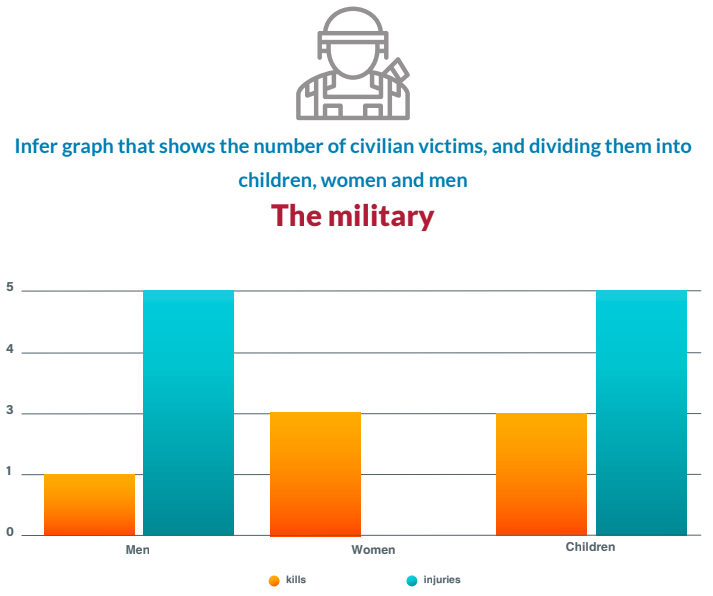
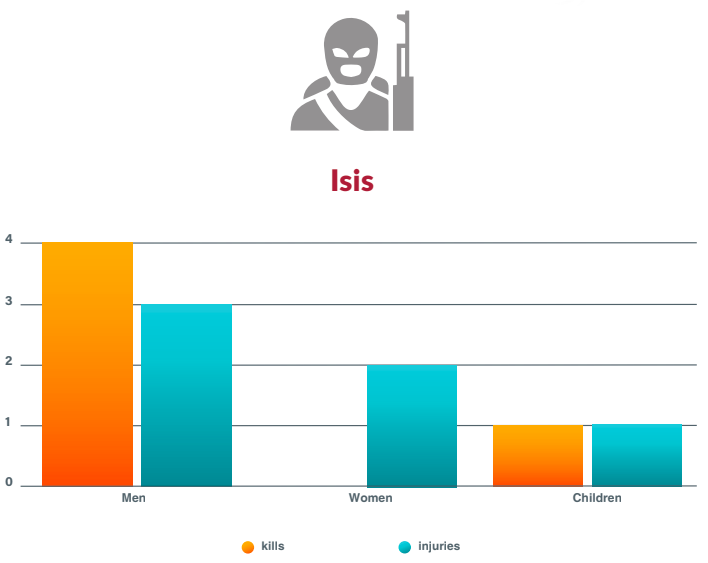
:Methodology of preparing the report
The report was prepared with severe difficulty due to the suffocating restrictions put in place by the Egyptian authorities on the reporting of human rights organizations and media. In the period between July 1st and September 30th of 2020, the “Sinai Foundation for Human Rights” has met 64 of Sinai’s elders and locals, as well as individuals from governmental and medical organizations, researchers, activists, and journalists whose names we can’t say due to the dangers of the situation the people of North Sinai live in, as the authorities restrict the publishing of any information that doesn’t align with the government’s directions. During this period, the foundations’ team has documented the arrest of an activist from Sinai on 04.08.2020 who had been recording abuses and publishing them on his Facebook page, to join two other activists, one of whom had been arrested two years prior and the other around six months prior, because of criticizing the armed forces’ actions in Sinai and publishing them on the internet.
This report is based on interviews and field visits the “Sinai Foundation” team has conducted. All the citizen and victim testimonies were given directly to the team. In some cases, the foundations’ researchers could read the victims’ medical reports through the official data passed through by medical sources. We have also analyzed the data about Sinai in the pages of the official spokesperson of the Ministry of Defense and the Ministry of Interior Affairs. The foundation could not officially speak to any of the Egyptian government and military sources, as they consider any humanitarian efforts as a breach of the secrecy imposed on Sinai, which puts the team in danger.
The “Sinai Foundation for Human Rights” agrees with other human rights organizations in considering the ongoing conflict in Sinai between the Egyptian armed forces and ISIS as a case that lives up to be a non-international armed conflict between governmental and non-governmental forces. Considering the conflict as a non-international armed conflict is based on many different standards that are present in the current situation in Sinai, which are: 1 – The long, ongoing period of hostility, 2 – The surpassing of the violence levels the normal levels to be considered an inside conflict, 3 – The irregular armed groups’ work according to a certain command and control structure.
On the basis of considering the conflict in Sinai as a non-international armed conflict, the International Humanitarian Law, which imposes a number of guarantees and precautionary measures related to the protection of civilians applies. The four agreements of the Geneva Convention and the two additional protocols are the basis for this law, which all human rights treaties apply to, were all agreed upon by Egypt, including the international and African standards. All these covenants fundamentally impose on the government and the involved parties in the conflict the obligation to respect the basic rights of the citizens.
This report includes the abuses focused on by the “Sinai Foundation”, and they are divided into the following:
- The Abuses by the Egyptian government:
a. The attacks and use of random indiscriminate weapons that lead to the death and injury of civilians.
b. Extrajudicial killings.
c. The destruction of civilian properties.
d. The denial and obstruction of access to employment due to discrimination.
e. Group punishments, expropriation, and forced displacement.
f. Arbitrary detention.
g. Using the area’s properties as a means for cover-ups.
h. The destruction and removal of livelihoods without compensation.
i. The destruction of healthcare units without giving suitable replacements.
j. Falsifying facts and providing false information.
2. Pro-government militia and irregular armed groups abuses.
3. The local ISIS affiliate, the Sinai Province group:
a. The abduction of civilians and implicating them in the conflict and taking their money.
b. Bloody attacks in the middle of populated areas.
c. Extrajudicial killings.
d. Using civilian properties for cover-ups or using them in attacks.
e. Indiscriminate attacks that do not differentiate between targets.
1. The Abuses by the Egyptian government:
a. Indiscriminate attacks and arms use that led to death or injury of civilians
Many injuries caused by indiscriminate attacks the civilians paid for with their lives. The rule prohibiting indiscriminate attacks is considered to be one of the most important basics of the International Human Rights Law that includes all armed conflicts, international and national, and it was referred to in international documents and treaties, among which is article 51 of the additional protocol (1) to the Geneva convention. The African Charter on Human and Peoples' Rights has also stated in article 4 that civilian lives should be preserved and insured at all times, including during conflicts.
In Sinai, many cases of injury and murder of civilians, as a result of random shootings by the armed forces have been recorded, but no prosecution was carried out to hold the culprits accountable, and official investigations were rarely carried out. The authorities record these incidents carried out by an official security force as against persons unknown, therefore there is no suspect to be held accountable and prosecuted.
As artillery shells are considered to be random targeting that can not discriminate and accurately strike, they are considered to be the kind of arms that the International Humanitarian Law has prohibited the use of in civilian areas, according to article 4/51 of the additional protocol (1) to the Geneva convention in 1977, which clearly defined “Indiscriminate attacks” as “ those which employ a method or means of combat the effects of which cannot be limited as required by this Protocol; and consequently, in each such case, are of a nature to strike military objectives and civilians or civilian objects without distinction.”
Egyptian law enforcement forces do not acknowledge the victims of their use of such weapons and attacks, and the administrative, medical, and security authorities state in their reports that the reason behind the casualties of those operations is reasons unknown, which protects the responsible authorities from any accountability or compensation due to the victims.
The first incident:
On 26.07.2020, two witnesses stated to the foundation’s team that the citizen “Ali Salim Mohamed Abo-Obaid”, 45 years old, from the village of “Rabea”, was shot by a group of the armed forces, stationed to the south of the village of “Rabea”. Both witness statements agreed that the victim posed no security threat to the forces and that they witnessed no clashes or presence of any ISIS individuals in the area. A medical source also stated that the aforementioned citizen is mentally disabled.
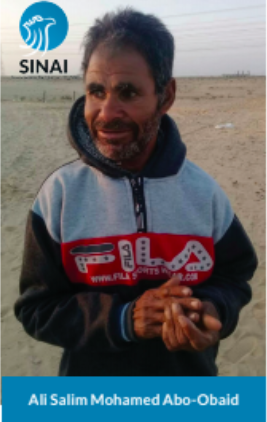
The second incident:
On the same day, 26.07.2020, an airstrike hit a civilian vehicle in the south of “Rabea” village, which led to the injury of two civilians. “Salim Salama Ahmed Shabana”, 44 years old, causing the amputation of one of his legs and lacerations of other bones. And “Ahmed Salama Salim Shabana”, 35 years old, who was lightly injured in some areas of the body, and moderately injured in others. The hospital administration, in the presence of members of the police, forced the families of the victims to sign official documents, according to medical sources.
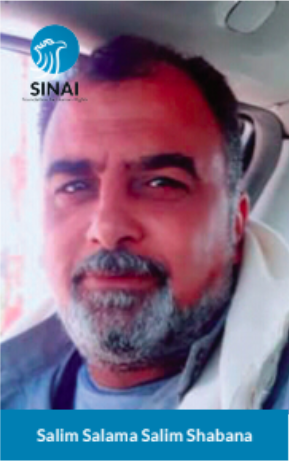
The third incident
At exactly 06:20 PM on Thursday 06.08.2020, the child “Arafat Awdat al-Masayrah”, 13 years old, was shot in his left leg while standing in front of his house in “al-Nasayrah” neighborhood in downtown “al-Sheikh Zuwayed”. The gunshots are proposed to have been shot from an army ambush above the “al-Sika Hadid” school for boys, from where the gunshots could be heard, regardless of the fact that no armed activity was active at that time. The citizens of the city were used to daily random shootings from the army ambushes, according to the eyewitnesses we met with.
Three of many eyewitnesses have mentioned to the “Sinai Foundation for Human Rights” that Egyptian army soldiers inside a military ambush created by the armed forces on top of the “al-Sika Hadid” school for boys took random shots in the total absence of any ISIS-affiliated armed forces or any security threat or shoot-outs. They insisted that at the time of the boy’s injury before Maghrib prayer aligned with the time the guns were shot from the army ambush. The eyewitnesses added that they got used to army groups inside and around the city of “al-Sheikh Zuwayed” shooting guns with the aim of security and declaring their preparedness on a daily basis; which caused the murder and injury of many civilians since the beginning of the military operations.
One of the child’s relatives has also revealed that the child’s father “Awda al-Nasayrah”, one of the elders “al-Sheikh Zuwayed”, had died on 12.12.2014 by a gunshot by his house coming from Camp “al-Zohor” in “al-Sheikh Zuwayed”
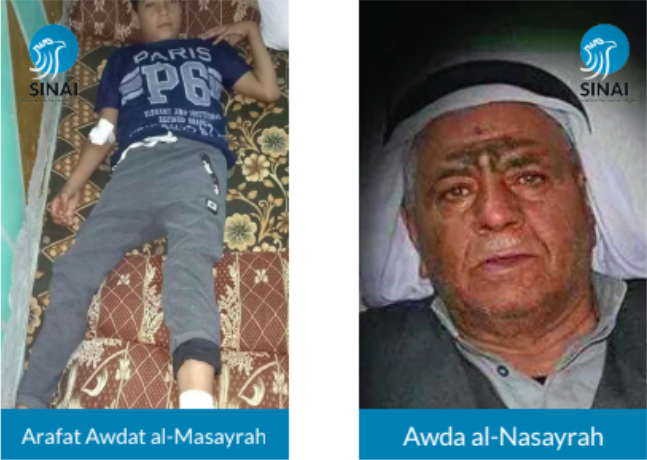
The fourth incident
In another bloody incident where the victims were young students that took place on 10.08.2020, guns were fired by an army force between the two villages of “Hemeisa” and “Abou-Jalloud” in “Bir al-Abd” in western Sinai on a “microbus” vehicle carrying civilians, most of whom were high school children on their way to school.
The “Sinai Foundation for Human Rights” met with one of the children who were on the bus, who said: “While we were going through a side road, we were surprised with rapid gunshots. We did not know what was happening. I tried to take cover by hiding under the seat. There was blood everywhere. When the bus stopped near one of the houses by the road, we hurried outside. We then realized that the gunshots were coming from a military group on duty in the south of the villages “Qatia” and “al-Marih”, which were under ISIS’s control for around 70 days, starting July 21st.
An eyewitness also added to the foundation: “None of the victims got the emergency medical help they needed because of heavy artillery bombardment and air attacks on the area. Ambulances were an hour late to pick up the injured, we saw them bleed out before us and we could not do anything about it. I think that “Ahmed” took his last breath in my arms. I had not known him before, but I will never forget him. Very hard and terrifying moments that felt like years. After a full hour, the ambulances arrived to take the victims to an aid station in “6th of October” village.”
Medical sources have revealed to the “Sinai Foundation” that: The ambulance moved four students. One of them died, and three others were injured, one of them was a girl. They are:
Death:
The student “Ahmed al-Said Abdul-Aziz”, 16 years old, a gunshot to the chest.
Injuries:
The student “Alaa Nasr Selmy”, 16 years old gunshots to different parts of the body, in critical condition. (Died later, on 04.09.2020 because of his injuries)
The student “Mahmoud Mihany Suliman”, 16 years old, gunshot to his left arm.
The student “Esraa Ibrahim Hassan”, 16 years old, gunshot to the stomach, needed microsurgery.
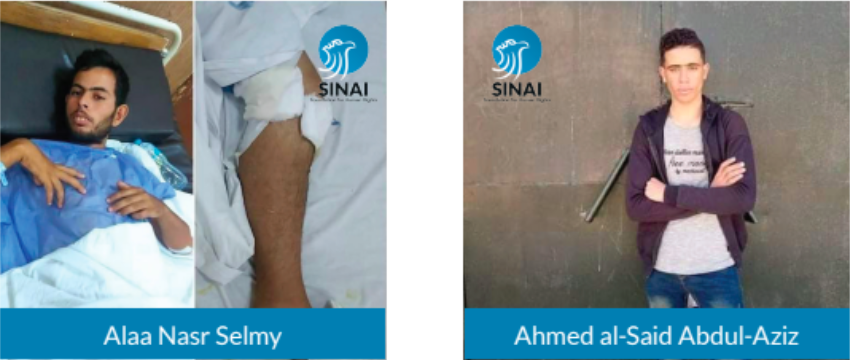
The fifth incident
In another incident that took place in “al-Sheikh Zuwayed” on 16.08.2020, a child called “Ahmed Badran Atallah”, 15 years old, was shot by a rogue bullet that settled in the base of his skull. A medical source stated to the “Sinai Foundation” that the victim lived in “al-Zohor” neighborhood in “al-Sheikh Zuwayed”, and that he was first moved to “al-Sheikh Zuwayed” general hospital, then was transferred to “al-Arish” general hospital due to the severity of the injury. He then was later transferred to “Kasr el-Ainy” hospital in Cairo due to the poor resources, and he’s still under treatment and the doctors have not decided whether to remove the bullet or keep it, because of the severe danger to the child’s life.
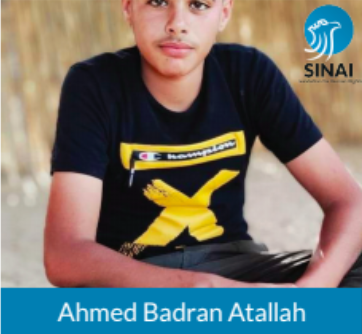
Two eyewitness accounts in “al-Zohor” neighborhood agreed on the recurrence of victims falling to gunshots and indiscriminate bombardment in “al-Zohor” neighborhood in “al-Sheikh Zuwayed” during the past months, fired by the armed forces that secure the city as a way to comb through and secure, despite the stable state the city has been in for almost a year. The “al-Zohor Camp” is located inside the city, and it is the largest military camp that partakes in the security operations in “al-Sheikh Zuwayed”, which has been used for indiscriminate shootings from watchtowers on top of apartment buildings.
The sixth incident
On 22.08.2020, a family in “al-Arish”, in northern Sinai, was horrified by the injury of three of its members, including a child, by indiscriminate gunshots that settled into different parts of their bodies, and the shots are thought to have come from a security point.
Information gathered by the “Sinai Foundation” from a medical source in “al-Arish” general hospital showed that the three victims are:
- Ahmed Suliman Salam, 34 years old, gunshot to his right leg.
- Ahmed Salim Salam, 42 years old, gunshot to his back.
- Aya Ahmed Salim, 12 years old, gunshot to the upper back.
An eyewitness living in the vicinity of “al-Zohor” neighborhood in the city of “al-Arish” stated that the three victims were shot by their house in an area between the two neighborhoods “Ibni Bitak al-Golf” and “al-Zohor” in “Kism Talit” police station area, “al-Arish”, saying that he heard gunshots coming from a security ambush stationed at the ring road to the south of the aforementioned area, stating that the neighbors who witnessed the incident called an ambulance to transfer the victims, which took them to “al-Arish” general hospital. He added that at the time of the incident, there were no clashes between the armed forces and armed groups and that he had not witnessed the presence of any ISIS-affiliated armed individuals in the area.
Another witness from the area added that the three victims were forcibly evicted from the village of “al-Shallak” in “al-Sheikh Zwayed”, a year before, after the security stranglehold and deadly indiscriminate bombings forced them to evacuate, looking for a safe, decent life in “al-Arish”, stating that the shooting from the surrounding ambushes happens continuously with the aim of security and that it is not the first time that civilians fall victim by accident.
As a routine procedure that results in losing the right to ask for holding the perpetrators accountable and compensating for damages, the “al-Arish’ general hospital administration reported the accident to the police station inside it, so the station wrote up a report that says that the cause of the injuries was gunshots of unknown sources, without investigating the incident.
The seventh incident
An Egyptian army ambush located in “al-Akour” village, southern “al-Sheikh Zwayed” has indiscriminately fired guns on 15.09.2020, murdering a 16-year-old.
An eyewitness from the village told the “Sinai Foundation for Human Rights” that “Nidal Muslim Hassan al-Babar” from the “Akour” family was hit by an indiscriminate gunshot that led to his death. He was then transported to “al-Sheikh Zwayed” general hospital, then was transferred to “al-Arish” central hospital, then to “Port Said” for the coronary report and identification of the cause of death, in order to get a burial permit. The witness stated that, at the time of the incident, no clashes were taking place between the armed forces and armed groups, and that the situation in the village was completely calm, and he didn’t notice any threats or movement by ISIS-affiliate armed groups that day.
Another eyewitness from the village, 48 years old, told the foundation team that the victim had been playing football with his friends in the adjacent city of “al-Shahaween”, and when they got back to “al-Akour” village before the Maghrib prayer, “Nidal” was shot in the head from the army ambush located in the village, despite the latter’s knowledge that the village young men usually wander at this time before the curfew, and it’s possible that all the people of the village might be known to the ambush team, due to the few number of locals, and the interviews the army patrols conduct with them on a regular basis.
Three other local citizens have revealed to us that a military post is located in the partially populated village, watching the vicinity of the area from all sides, and reviewing the citizen data and what they buy when shopping on a daily basis. And that most of the locals were forcibly evicted to different areas due to the shaky security circumstances and the restrictions and their inability to work and to till their fields.
The victim, “Nidal”, was his parents’ only child. And he was supposed to go to the Health Technical Institute in Ismailia after he got his high school diploma that year. Therefore, his murder was a shock to his parents who decided to bury him in Ismailia where they were living after they were evicted from the village.
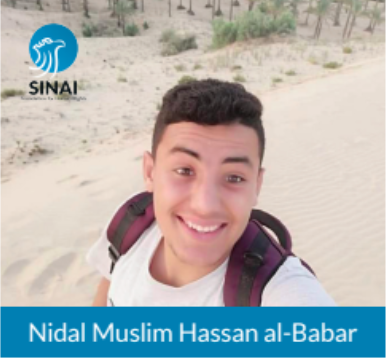
b. Extrajudicial killings
The principle of discriminating between civilians and fighters during conflicts are regulated internationally by the rules of armed conflict that state that only fighters are to be attacked, not civilians. It was also stated in the United National General Assembly resolution in 1968 about the respect of human rights during armed conflicts, that discrimination should be applied during all armed conflicts.
In Sinai, murder at military checkpoints or by random shootings coming from those places is horrible, common crimes. And despite that, no persecution of the perpetrators was ever conducted, which is an extreme violation of international agreements and national and international laws Egypt abides by, including the African Charter on Human and Peoples’ Rights which has also stated in article 4 that civilian lives should be preserved and insured at all times, including during conflict, which the African Charter on Human and People Rights has also considered to be the basis for all rights and it is non-derogable.
The first incident
On 19.08.2020, an elderly citizen called “Ali Dawood al-Alawy”, 62 years old, was killed by a bullet shot by an army patrol. A family member told the “Sinai Foundation” that the deceased was killed by a bullet shot by an army patrol during his attempt to evacuate his House in “al-Marih” village, stating that the reason he left was to save his own life after the security circumstances got much worse in the village and its surroundings and that the military force that shot him was situated near the railway of the “6th of October” village.
The previous statement aligned with another statement made by a relative of the deceased, who told us that the armed forces shot him despite the family’s planning with the armed forces with the help of the family elder, who’s in close contact with the authorities, to get him out.
According to a medical source that spoke to the foundation team, the body of the deceased Was taken to “Bir al-Abd” general hospital.
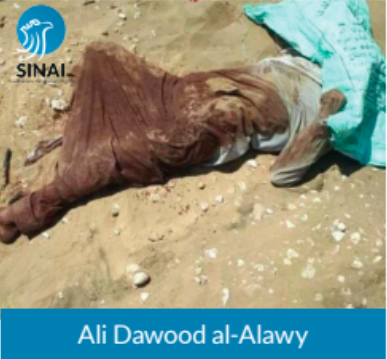
The second incident
A 21-year-old girl was killed on 06.09.2020 as a result of a gunshot coming out of a security ambush toward a car that was transferring her and some family members and passed through the army checkpoint situated at the entrance of the city of “al-Qantara Sharq” in western Sinai.
The “Sinai Foundation for Human Rights” met with two eyewitnesses who told us the details of the incident. They stated that the girl “Jihad Awad Abdul-Karim Ahmed”, born 1999, student at the Faculty of Education - al-Arish University, was with her mother in a small civilian vehicle that passed through “al-Muthalath” ambush, where members of the armed forces and the police force are stationed. And that the driver tried to pass through the barrier, disobeying orders from the soldiers to stop, which led them to start shooting toward the passengers, without the vehicle or its passengers posing any threat that justifies the use of deadly gunfire to deal with the incident.
The heavy gunfire coming from the ambush killed the girl. Medical sources have stated that “jihad” died due to a gunshot to the neck which to lead to heavy bleeding, and her body was moved to “al-Qantara” general hospital, then, with great sadness, she was buried in the family burial grounds in “Sharqiya”, as the victim had celebrated her engagement 10 days prior and was coming back from Ismailia with her mother after buying her wedding supplies.

The behavior of the security forces in this incident is considered to be a portrayal of the disregard for the proportionality in attack principle in the International Humanitarian Law, which specifies the legality of a certain action in accordance with the respect of the balance between the end, the means and the way used to reach the end and the consequences of the action.
According to the context, the excessive shooting was aimed at a non-threatening target, either in itself, or in its passengers, and no army privilege gives the right for such a dangerous action, which led to an extrajudicial killing.
c. The destruction of civilian properties
Without legal justification, the armed forces have caused damages to, or the destruction of a number of civilian properties that provide essential needs to the locals and civilians in the conflict areas in North Sinai, with no compensation or reconstruction to the damages the military operations usually left behind. The International Humanitarian Law prohibits the targeting and destruction of civilian objects, including houses, during national and international conflicts, as long as they are not used for military purposes. It has emphasized the protection of civilian objects in many conventions and treaties, including article 52 of the 1977 Additional Protocol (I) to the Geneva Conventions.
It is very rare for the opposing parties involved in the Sinai armed conflicts to differentiate between civilian properties, despite the Egyptian authorities’ international commitment when it comes to that point. The International Humanitarian Law emphasizes the respect of civilian properties at all times, including during armed conflicts.
The first incident
On 02.08.2020, many houses that belonged to civilians displaced from their homes, running away from ongoing conflicts, were destroyed. We at the “Sinai Foundation” have recorded an airstrike on a three-story house that belongs to the citizen “Hussein Hassan Daiban”, also known as “Hussein al-Karawy”, in the “al-Ganayen” village, southeast “Rabea” in the city of “Bir al-Abd”, western Sinai. An eyewitness stated in an interview with the “Sinai Foundation for Human Rights” that the house was severely damaged, while there were no human casualties due to its vacancy of its inhabitants who’d been evicted a week earlier toward relatives of theirs in “Bir al-Abd” due to the circumstances that led to the deterioration in many ways, stating that he witnessed the destruction of the house during the presence of a military aircraft in the area. The eyewitness did not give us an answer to whether there were ISIS-affiliate members inside the house or close by, insisting that he left hurriedly
A farmer from “al-Ganayen” village told the foundation team that they don’t know how damaged their properties were back in the village, also their farms and livestock that need daily attention are in danger of dying off. He stated that their efforts the entire growing season have almost gone to waste, and they’re experiencing great losses because of that, as most farmers in the area are in debt and are waiting for the gathering season to pay off their debts.
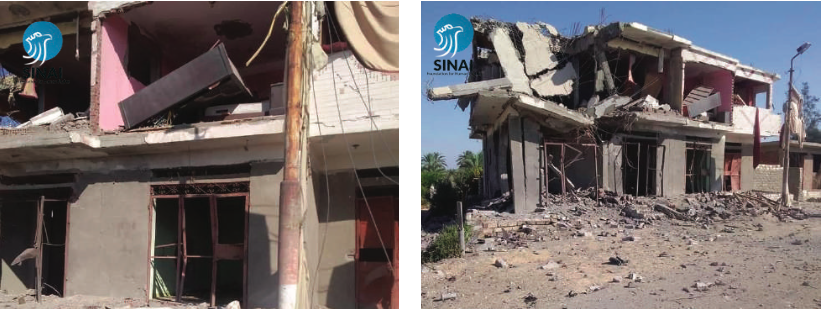
The second incident
On 05.08.2020, the “Sinai Foundation” observed an artillery bombardment and airstrikes that targeted many houses belonging to citizens displaced from “Rabea”, “al-Ganayen”, “Qatiya”, “Iqtiya” and “Merih” in “Bir al-Abd” in Sinai. We at the foundation spoke with an eyewitness who saw the remains of a house belonging to the citizen “Emad Salman Dawood”, located in “Merih” village.
Testimonies
The witness told the “Sinai Foundation for Human Rights” that the house was badly damaged due to a military aircraft bombardment, but there were no human casualties as the inhabitants had abandoned the house due to the takeover of ISIS militants of many villages in “Bir al-Abd”.
The foundation’s monitoring team managed to record a military aircraft bombardment of four civilian houses, but they could not contact the owners of the houses or witnesses. The foundation insists that they cannot assume whether some ISIS militias were hiding in the houses or not. These houses belong to:
1. Ali Hamouda Nassir, “al-Sabil neighborhood/Rabea village”.
2. Hamza Ibrahim Abu-Samra, “Iqtiya village”.
3. Sa’id Hagroud al-Mathoun, “Um-Aqaba village”.
4. Salam Gahtoud al-Mathoun, “Um-Aqaba village”.
The third incident
On another side, on 16.08.2020, a military raid with a bulldozer, a number of tanks, and explosive experts blew up houses in “al-Sakadra” village, at the cost of “Al-Sheikh Zwayed”, eastern Sinai.
An eyewitness from “al-Sheikh Zwayed” informed the “Sinai Foundation for Human Rights” that the raid destroyed 10 Bedouin houses near the abandoned “al-Salam” middle school. They were houses whose inhabitants had to evacuate in April/May of 2020, adding that those were not the first demolition operations.
One of the locals forcibly displaced from “al-Sakadra” village has revealed in his statement to the foundation team “a previous interview in July 2020” that during the past April and May, the security forces didn’t allow anyone to stay in the village. And that regular forced displacement operations that took place were preceded by a stranglehold on people’s way of earning their livelihoods, as they repeatedly cut off the power on the village for long periods of time, then started randomly dropping bombs on the village and its surrounding, which led the locals to quickly flee with their lives.
Another eyewitness testimony “a previous interview in July 2020” agreed with the previous two that the bombings that blew up and destroyed the houses started right after the locals evacuated the village. They were claimed to be caused by the explosion of an explosive device on a military vehicle in the area, so the armed forces started tearing down and removing the surrounding houses close to the area of the explosion first, then expanded to many different areas. And that the citizens of “al-Sheikh Zwayed”, which is close to “al-Sakadra” village could hear the sounds of houses exploding on a daily basis, and see the smoke resulting from the rapid destruction and demolition operations in the village.
Another eyewitness testimony “a previous interview in July 2020” agreed with the previous two that the bombings that blew up and destroyed the houses started right after the locals evacuated the village. They were claimed to be caused by the explosion of an explosive device on a military vehicle in the area, so the armed forces started demolishing and removing the surrounding houses close to the area of the explosion first, then expanded to many different areas. And that the citizens of “al-Sheikh Zwayed”, which is close to “al-Sakadra” village hear the sounds of houses exploding on a daily basis, and see the smoke resulting from the rapid destruction and demolition operations in the village.
The fourth incident
In another incident that took place on 17.08.2020, a citizen called “Hamza Ibrahim Abu-Samra” revealed that his house, located in “Iqtiya” in “Bir al-Abd” in North Sinai, was destroyed due to an airstrike that completely destroyed his house. He only commented on the destruction of his house when he posted a photo of the rubble on Facebook saying: “Alhamdulillah for everything, Allah compensates.” referring to the destruction of his house on the 27th of last July.
The fifth incident
On 01.09.2020, the Egyptian armed forces blew up and destroyed a number of houses in western “Rafah” in a military raid that started at the end of August and lasted for the entirety of September, accompanied by bulldozers to demolish the houses and clear the lands.
A 48-year-old eyewitness living in “al-Sheikh Zwayed” told the “Sinai Foundation for Human Rights” team that this operation had been ongoing since the last week of August and had destroyed houses in “Al-Metula” and “al-Wifaq” in “Rafah”, stating that the smoke clouds and white dust resulting from the bombings were so high that the locals could see what was happening from a relatively far distance.
The eyewitness says that the number of houses destroyed could reach six houses daily, and that is based on the explosions sounding every once in a while during the day.
The foundation’s monitoring group managed to get exclusive photos that document the moment armed force members bombed down evicted civilians’ houses outside the buffer zone set by the Egyptian military on the border with Gaza strip to stop smuggling through tunnels.
Two locals from “al-Sheikh Zwayed” we met on 08.09.2020, stated that the sounds of explosions and destruction were nonstop during this period and that the smoke plumes appeared above many places at different times, preceded by loud explosions. It is the usual in Sanai that the sighting of soaring smoke plumes and white dust means that an explosion hit civilian properties.
“Al-Metula” and “al-Wifaq” are considered to be of the villages that were turned into uninhabited areas after the citizens were forcibly displaced due to random bombardment and military operations. It is important to notice that these villages lie outside the vicinity of the buffer zone, around five meters into Egyptian soil and that the removal of those houses and their annihilation by the military points to the presence of premeditated intention not to allow the citizens to go back to their villages, including those whose houses lie outside the borders of the buffer zone with Gaza strip.
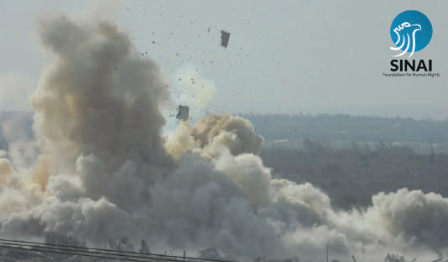
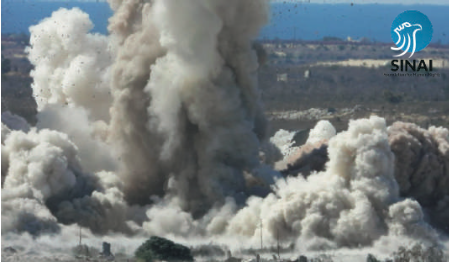
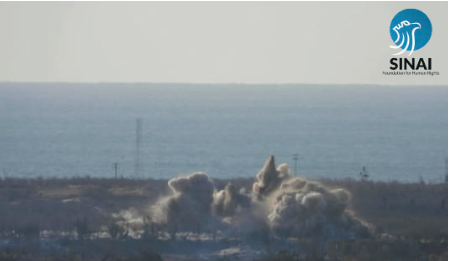
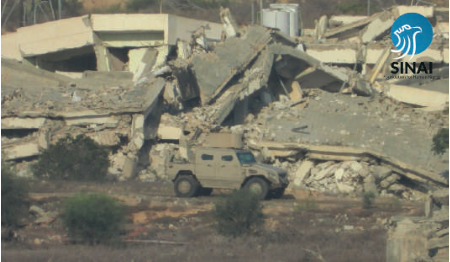
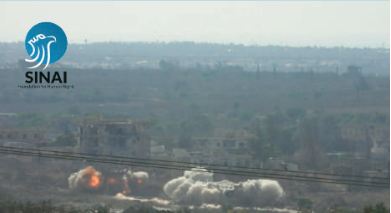
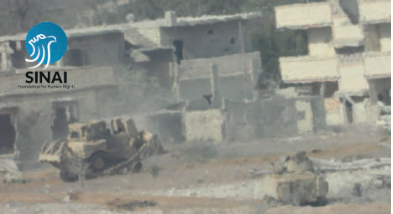
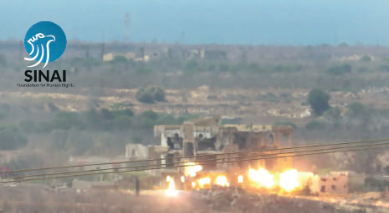
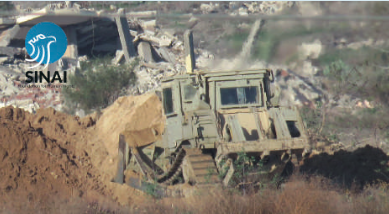
The sixth incident
On 03.09.2020, an army patrol bombed two schools, “al-Salam” middle school and “al-Shati’” elementary school in “al-Sakadra” on the coast of “al-Sheikh Zwayed”.
A local eyewitness reported to the “Sinai Foundation” that the two schools were bombed and completely destroyed without informing the relevant education authorities, noting that the village locals had been evacuated not too long before.
Two other eyewitness statements agreed that the houses to the east of the water treatment plant in the village, in addition to the village mosque, were totally destroyed by bombing during the past weeks. The “Sinai Foundation” team could not count the number of destroyed houses, and neither could the locals.
A taxi driver from “al-Sheikh Zwayed” added in an interview with the “Sinai Foundation” team that he made it to the water treatment plant and managed to see the rubble of the destroyed houses close by.
Most houses in “al-Sakadra” village are the property of members of two families, “al-Maragda” and “al-Sakadra”. This village is considered to be one of the agricultural areas that were leveled and became unfit for agriculture after the owners could not get back to it. They were also not compensated after they were forcibly evicted from the village in the past Ramadan toward different areas of North Sinai.
d. The denial and obstruction of employment due to discrimination
Principles of justice and active legislations prohibit any decisions based on a discriminatory basis, whether based on identity, sex, or region. The laws also guarantee individuals their right to choose their occupation in accordance with fair, satisfactory conditions, and protection from unemployment.
On 05.06.2020, the local authorities responsible for “Bardawil” lake canceled the official date for the opening of its fishing season that is supposed to be from the 1st of May till the 30th of December without assigning a different date for it. Then, the administration for the lake decided on the start of the season later on the 5th of June, but the authorities renewed the order to forbid fishing, this time indefinitely, combining the prohibition on fishing in the lake with the prohibition on fishing in the coasts of North Sinai as well, which has been ongoing since its establishment in February 2018. It is one of the consequences of the comprehensive military operations set in motion on the same day, and are still ongoing till this moment, which has turned all fishing families into destitute families.
It is worth mentioning that this legislation is based on a locally discriminatory basis, as it only prohibits the fishermen from North Sinai from working, while fishermen from other governorates can freely fish on the coasts of North Sinai without hindrance.
The suffering of fishermen in “al-Bardawil” lake, Egypt’s second-largest lake, located in North Sinai, was doubled when the fishermen received a negative response from the Ministry of Defense, confirming the prohibition on currently and indefinitely fishing in the lake.
The “Bir al-Abd” district Egyptian Parliament (House of Representatives) member “Salama al-Raki”. I received a reply from the Ministry of Defense secretariat on the 29th of July, and he informed the media on 17.08.2020 referring to “the inability to use fishing boats on the Mediterranean sea coast from “Port Said” west toward the eastern international borders.” and “No practicing any fishing activity in the lake for the time being.”, this decision is made despite the fishermen already paying fishing licensing insurance fees.
Around 2500 fishermen profit from “al-Bardawil” lake, which is considered their base or sole source of income. It is usually opened up for fishing at the beginning of May of every year and up until December, but this routine was broken by the comprehensive military operation launched on 09.02.2018, which was accompanied by a large restriction on ways of decent livelihood that’s still ongoing till this day.
The suffering doesn’t stop at fishing in “al-Bardawil” lake, it also includes the restriction on fishing at the coasts of the Mediterranean sea that has been in place for more than two and a half years, where it is completely prohibited to use floaters or fishing boats, and this ban and its consequences include only the fishermen of North Sinai. According to the testimony of a fisherman in his fifties from “Abou-Saqal” neighborhood in “al-Arish”, they see fishing boats coming from “Damietta” and “Port Said” freely fishing in the sea without hindrance or the ban being applied to them, while it is only applied to fishermen from North Sinai. He also stated that the prices of fish have been raised to the point where most people can not afford them and that merchants in the governorate currently buy fish from “Damietta” at a higher price, added to which is the transportation cost, confirming that the governorate’s fishermen are being subjected to terrible unfairness, as they can’t work and have no income, and the government is not offering any compensation or social assistance.
Fishing is a basic job for coastal cities and areas that ensures a decent life for thousands of people. To the locals of Sinai, the comprehensive military operations that started in February 2018 have taken a huge toll on the people of Sinai that is still ongoing until now. The Universal Declaration of Human Rights guarantees in article 23 everyone’s right to work, and “Free choice of employment, to just and favorable conditions of work and to protection against unemployment.”
The government’s decision to ban fishing without giving replacements, compensation, or suitable pension is considered to be a violation of civilians’ right to work and live a decent life. And it is a regionally discriminatorily based violation that targets only the fishermen of North Sinai, as the authorities allow fishermen from other governorates, such as “Port Said” and “Damietta” to use their boats for fishing on the coasts of the governorate without any restrictions
e. Group punishment, expropriation, and forced displacement
International conduct regulation legislations impose special protection to local properties during conflicts, and it considers forcing inhabitants to evacuate their properties a punishable offense. In conflict areas, intentional, random, or non-proportionate attacks on civilians and their properties are prohibited, and that includes tearing down houses in the absence of a military need that requires a teardown.
The first incident
On 04.07.2020, six soldiers were injured by an explosive device that blew their car up during its passing through the uninhabited village of “Sakadra” in “al-Sheikh Zwayed”, after the inhabitants were forcibly evacuated the past, Ramadan, in April/May 2020.
A taxi driver working in the area told the “Sinai Foundation”: “The day after the explosion, I witnessed an army patrol coming to the village and bombing uninhabited houses in the vicinity of the area where the explosive device went off, and we could not find out how many houses were destroyed.”
Three local “al-Sheikh Zwayed” citizens told us that the sound of explosions was nonstop in the village for multiple days, and white smoke could be seen coming from the village, which is a sight the locals got used to when the armed forces plant explosive devices in houses and buildings to blow them up.
A local resident who was forcibly evicted from “al-Sakadra'' village revealed in an interview with the foundation team that during the previous April and May, the security forces did not allow anyone to stay in the village. And that the organized evacuation processes were preceded by a stranglehold on people’s way of earning their livelihoods, as they repeatedly cut off the power on the village for long periods of time, then started randomly dropping bombs on the village and its surrounding, which led the locals to quickly flee with their lives.
Another eyewitness testimony agreed with the previous statement that the bombardment and destruction of houses started right after the evacuation of the village and that they started with the claim that an explosive device went off on a military vehicle in the area. The armed forces started tearing down and removing the houses surrounding the explosion site first, then the range increased to include many areas. Also that the nearby village “al-Sheikh Zuweid” locals hear house explosion sounds almost on a daily basis and see the rising smoke plumes caused by the rapid teardown and demolition processes in the village.
“Al-Sakadra” village is one of the “al-Sheikh Zwayed” villages, in “Sakadra” outside the buffer zone, as it is 16 km away from the border with Gaza strip, and its population is around 3000 people, according to the latest statistic by Central Agency for Public Mobilization and Statistics in 2016. Its inhabitants had been forcibly evacuated due to military operations and it was turned into regions with empty, almost destroyed houses because of the military operations.
Involuntary displacement in North Sinai is considered to be one of its most prominent tragic phenomena, and it’s the result of severe struggles the locals faced because of the violent conflict and violation of their rights and depriving them of their most basic needs. According to the United Nations’ guiding principles of “internal displacement”, the Egyptian government is legally obligated to treat the “internally displaced” in accordance with: “Internally displaced persons shall enjoy, in full equality, the same rights and freedoms under international and domestic law as do other persons in their country.” and ” Internally displaced persons have the right to request and to receive protection and humanitarian assistance from these authorities.”
The second incident
On 14.07.2020, the “Ismailia” governorate special forces conducted a house and simple constructions demolishing campaign in the “7 Kilo” area in “Ismailia”, inhabited by hundreds of forcibly displaced families from “Rafah” in North Sinai.
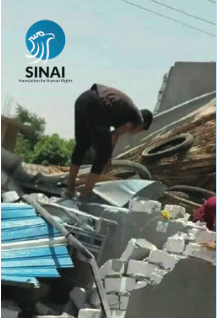
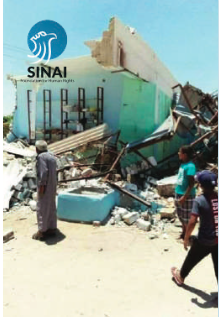
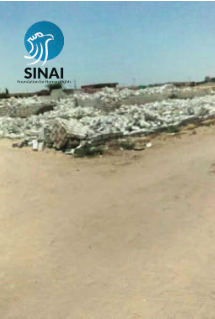
A Rafah citizen has told the “Sinai Foundation for Human Rights” that this campaign, accompanied by a security force, demolished the houses on the basis that they’d been built in an unauthorized area, and that they are legally categorized as agricultural lands, not for housing. He stated that the demolishing campaigns destroyed empty houses and shops and that the occupants of the houses were given a notice to get their affairs in order according to the law, which is administratively impossible unless the higher authorities intervened.
That led the lawyer “Ahmed al-Askary” from “Rafah” to write a petition to the president asking him to make a decree that reconciles the circumstances of those evicted due to their exceptional situation.
One of those evicted spoke with the “Sinai Foundation for Human Rights” in an interview, saying that the number of families evicted from “Rafah” and settled in that area is around 700 families, which rounds up to almost 3000 citizens. He stated that the security forces which accompanied the campaign stopped a number of citizens and wrote them up for trespassing on agricultural lands, without taking into consideration their extremely hard circumstances, and how that caused the continuation of their suffering which started with the destruction of their houses in “Rafah” and they were forced to evacuate. He added that the houses they built in this area are only simple structures, some of them are locally called “eshash”, or “coops”, and others have tin roofs, which shows the poverty and need those families are living in. He said that this area is the place of the incident, and despite the fact that it’s classified as agricultural land, they are not in use agriculturally, which made it considerably cheaper, compared to other areas. He finished by saying: “What do our children have to do with this? What did they do to deserve to live their lives from one destruction to another, and from eviction to another, whether in “Rafah” or “Ismailia”.”
According to a local eyewitness, some of the elders of “Rafah” tried to act as mediums between the specialized authorities in “Ismailia” and the locals to ask them to stop the tear-down operations and to release the detainees, which did happen, but the removal operations are still going with every intensive campaign being launched without consideration of the circumstances of those evicted.
One of those evicted has complained of the unfair and inhumane treatment with which the evicted from North Sinai are being treated. He revealed that the demolishing campaign is a second group punishment aimed at the previous inhabitants of “Rafah”. Stating that many of the families living in the area put all their savings into the building of those houses, then the houses were torn down and they became homeless again. He quizzically asked: “Is the law after us and only us?”
The monitoring and documenting team in the “Sinai Foundation for Human Rights” has recorded previous demolishing and removal campaigns with the same background, that included areas where the evicted from “Abu-Tufaila” and “Kilo 17” live in “Ismailia”. They took place during different times of October 2018 and 2019, also during February and July of the current year.
According to the latest survey of the Central Agency for Public Mobilization and Statistics in 2016, the border part of “Rafah” is inhabited by around 77,206 people, spread between 11 villages, which are “Abu-Shnar, al-Mutala, al-Husainat, al-Khrafin, al-Wifaq, al-Taira, al-Mahdiya, Nagaa Shabana, Goz Abu-Raad, Kilo 21 and al-Barath”. All those villages are completely devoid of inhabitants, except for the latter.
Starting October 2014, the eviction of the people of “Rafah” and tearing down their houses started to create the “buffer zone” that extends 5 meters into the Egyptian grounds and is parallel to the common borders with Gaza strip. The forced eviction operations lasted till 2018 when the remaining citizens were forced to evacuate due to the group punishment policy that became more prominent with the launch of the comprehensive operation “Sinai 2018”.
The government gave out financial compensation to some civilian migrants, but most did not receive any compensation five years after leaving despite the Egyptian government’s promises. The rest of the inhabitants not living within the borders of the buffer zone moved due to the bombing and random shootings and the lack of means for a decent life in the area after the increase in severity of the clashes between the Egyptian military and ISIS, which turned where they lived into a warzone, and those people were not financially compensated.
f. Arbitrary detention
The Egyptian security authorities practice major oppression on activists and the opposition in Sinai, with the aim of silencing them and confirming the state of media blackout imposed on Sinai since the beginning of the military operations, using many ways, one of which is arbitrary detention. The Universal Declaration of Human Rights states in article 9 that “Everyone has the right to liberty and security of person. No one shall be subjected to arbitrary arrest or detention. No one shall be deprived of his liberty except on such grounds and in accordance with such procedure as are established by law”, and the Egyptian constitution states in article 54 that “Personal freedom is a natural right” and that “citizens may only be apprehended, searched, arrested, or have their freedoms restricted by a causal judicial warrant necessitated by an investigation. All those whose freedoms have been restricted shall be immediately informed of the causes, therefore, notified of their rights in writing, be allowed to immediately contact their family and lawyer”, which is all no more than just written words in Sinai.
On 04.08.2020, a police force arrested the Sinai activist and leftwing leader “Ashraf Ahmed Suliman Ayub”, 58 years old, and his son “Sherif”, from their home in “al-Bahr” street in “al-Arish”. “Ashraf” is considered to be one of the most famous activists in Sinai, who documents the violations the conflicting sides inflict on civilians. Later, 4 days after the unexplainable arrest, the authorities released “Sherif” and kept his father, who till the time of writing this report, has not been able to contact his lawyer, and has not been presented to the public prosecutor’s office.
One of Ashraf’s relatives spoke to the “Sinai Foundation for Human Rights” about what happened, he stated that the force that performed the arrest is a subsidiary of the second unit of “al-Arish” police department and that they broke into the house at around two in the morning. He said that they showed no legal warrant and gave no reason for the arrest. He said that the two detainees were transferred to the National Security Agency branch in “al-Salam” suburb in “al-Arish”. He added that the family is extremely worried about “Ashraf” because of his unstable medical condition, as he has trouble walking and has been in need of assistance with his affairs for 10 years after being in a traffic accident.
It is worth mentioning that the security authorities practice severe oppression on activists and the opposition in Sinai with the aim of silencing them and confirming the state of media blackout imposed on Sinai since the beginning of the military operations, as they have been holding the two leftwing activists “Ayman Obaid Mahomoud al-Ratil”, 48 years old, for two years, and “Ashraf Ibrahim Salih al-Hofny”, 51 years old, the founder of “The People’s Committee in al-Arish” for around 6 months, presumably because he criticized the military’s practices in Sinai on social media.
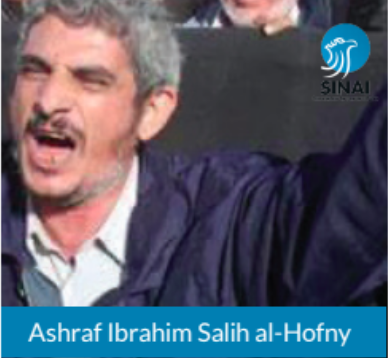
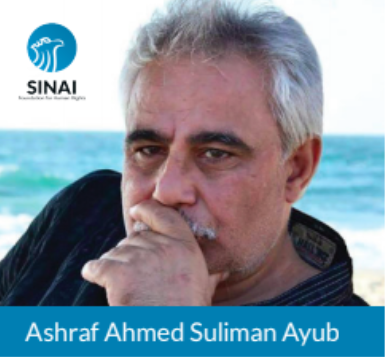
g. Using the area’s properties as a means for cover-ups
Using civilian properties as a cover-up, spreading military checkpoints in the middle of residential areas, and using civilians properties in the armed conflict turns them into military targets, which puts them in danger of being targeted and completely or partially destroyed, or taken over in a way that defies the International Humanitarian Law that protects them and obligates the conflicting parties to not use them in ways that might cause them harm.
Article 7 of the 1977 Additional Protocol (I) to the Geneva Conventions states “The presence or movements of the civilian population or individual civilians shall not be used to render certain points or areas immune from military operations, in particular in attempts to shield military objectives from attacks or to shield, favor or impede military operations. The Parties to the conflict shall not direct the movement of the civilian population or individual civilians in order to attempt to shield military objectives from attacks or to shield military operations.”
In an incident that could be considered an irresponsible action on 07.08.2020, the Armed forces set up a security checkpoint in an apartment building owned by the citizen “Mansour Eid Mansour” in “Um-Akaba” village in “Bir al-Abd”
A local eyewitness told the “Sinai Foundation” that no one asked the inhabitants of the apartment building their opinion about setting up the military checkpoint on top of their houses, and they were given no prior warning. When the family asked how long the force was staying inside their house, the commanding officer gave no straight answer, saying: “Don’t you love Egypt? You have to help!”
One of the owners of the house’s relatives spoke with us saying: “The family felt like the military was using them as human shields. They were too scared to show any sign of disagreement with the military, fearing their reaction. They feared that this disagreement may be wrongfully explained as unsupportive of the military in its war against terrorism. We know what they do to those suspected of that. Best case scenario, they’d be arrested and disappear for months, and no one would know what happened to them.”
He stated that elderly Mr. Eid and his wife stayed in the first floor, and that the officer ignored their pleas for the military to not use their house, fearing that the house could be targeted by armed groups, but the officer replied to them saying: “We are here to protect you from terrorism.”
He added that the house’s owner thought more than once to leave the house for the time being and return when the circumstances were calmer, but his fear of what happened to the houses of those displaced from “Rafah” and “al-Sheikh Zwayed” happening to his house was what stopped him every time.
We later learned from one of the neighbors that during the force’s stationing in the top level of the house, the house was shot at by ISIS, and that many clashes took place between the military forces and armed groups stationed in the olive farms southern the village of “Um-Aqaba”. In addition to a military force firing shots all night with the aim of securing the house, which made the inhabitants’ lives very hard and scary.
A local has also stated that there was a wave of evacuation from the houses in the villages of “Um-Aqaba” and “al-Fath”, as a result of the military security ambushes that started being set up in many areas in the middle of populated areas in western “Bir al-Abd”. He added that the preparations that appeared on the security points seemed to be in preparation for possible clashes, which led the locals to flee with their lives.
h. The destruction and removal of livelihoods without compensation
The demolition operations in civilian lands and properties that the authorities perform in Sinai are considered to be the most important reason for migration and displacement from the region, as it turned vast, producing agricultural lands, inhabited by many, into desert areas, evacuated by people who were not compensated for the severe harm that befell them. According to the 1966 International Covenant on Economic, Social, and Cultural Rights in article 5, no state, group, or individuals are to engage in any activity of performing any act “aimed at the destruction of any of the rights or freedoms recognized herein”, which includes civilian livelihoods.
The first incident
On 11.08.2020, military bulldozers started removing olive farms in the vicinity of “al-Arajin”, south “Abu-Tawila” village, subsidiary to “al-Sheikh Zwayed”, northern Sinai, which led to the loss of 18 farms in the area and the bombing of five uninhabited houses.
A farmer in the village stated in an interview with “Sinai Foundation for Human Rights” that members of the military forced him and other farmers to cut down their own trees, adding: “I felt bitterness and deep sadness like I was in a nightmare. I plant those trees, and I am the one cutting them down! Where’s fairness in this life?”
The witness added that the farmers had been waiting for their crops to sell them in a month, as it is their sole source of income, and that that was considered a well-known indicator that they were getting evicted like what had happened in many areas in North Sinai.
While another witness, who is a farm owner, complained to us that he lost his most important source of income and that no one promised him fair compensation. And that the owners of most farms where this happened were not compensated for their losses, as some of them had their farms cleared two years ago, and no compensation has been offered.
As for the reason behind clearing those farms was explained to us by a local activist that the “Peshmerga”, which is a local name the citizens call the civilians who assist the military, claimed that the trees were blocking the view from the military base near the area and that ISIS armed individuals have sneaked through those farms and killed a number of “Peshmerga”.
The second incident
On 7.09.2020, the Egyptian armed forces ordered farm owners in the “al-Zohor” camp in “al-Sheikh Zwayed” to cut down their trees in areas that reached 500 meters east, south, and north of the camp, as eyewitnesses reported to representatives of “Sinai Foundation for Human Rights”, and that lies within the army's systematic restriction policy against civilians in northern Sinai.
A farmer told the foundation's team that he headed to his farm once he heard the army’s report that allowed owners to go to their farms and that he chose to go to his farm, in order to check up on it and to benefit from the dry olive and citrus trees, either by selling them as firewood or using them for cooking and heating during the upcoming winter. For four years, locals were not allowed to reach their farms at all, leaving most of the trees dry and damaged.
The farmer said: “I could reach my farm for the first time after turning in my ID to the “al-Zohor” camp police checkpoint, as a guarantee they asked from all the farmers. Seeing my farm after a long time of deprivation was shocking. The fruitful olive trees were dry and weathered. It was such a cruel scene.”
Once he arrived, he and his sons started to uproot the trees that would be good as firewood or for selling. They gathered what could fit in a small pick-up truck, in order to come back the next day to finish the work. But then he was unable to go back after armed civilian militia elements, who took over the farm and started uprooting what was left inside, threatened him, and told him to leave immediately.
The farmer revealed that these civilian militias belonged to the “peshmerga”; civilians who cooperate with the army, and he added that what he experienced also happened with other farm owners in order to prevent them from getting any use of what was left of their farms. This testimony was confirmed by another farmer, who declared that “peshmerga”, the well-known young men in “al-Sheikh Zwayed”, were telling the farmers: “If you don’t like it, go and file complaints to “al-Zohor”, meaning the security camp. He also said that they only let the people cut the useless Tamarisk and kept the others for themselves.
The military camp did not determine the reasons that pushed them to order cutting down the trees after years of preventing the farmers from reaching their farms, despite the dryness of their trees. Some locals saw that military leaders aimed to clear the scene around the “al-Zohor” neighborhood out of which the military operations are being run all over “al-Sheikh Zwayed” center, which lies under strict guard with complete prevention of civil movements. Residents are subject to tight security procedures as they enter and exit the neighborhood.
i. Destroying Health Facilities Without Providing Suitable Alternatives
The international law and related treaties protect health units and hospitals from any military or retaliation operations that target them. Customary international law also imposes the protection of health and medical units, either in national or international armed conflict.
According to the additional protocol (II) to the Geneva Convention, 1977, Article 1-11, medical units, and transports should be protected. And in violation of that; an Egyptian military force blew up and destroyed two health units on 18.08.2020, the first one located in the village of “al-Sakadra” and the second was in the village of “al-Aqour”, subsidiary of “al-Sheikh Zwayed” in North Sinai.
An eyewitness from the village of “Abu-Tawila” which is close to the incident location, reported to Sinai Foundation for Human Rights that the “al-Aqour” health unit was forcibly emptied by the military two years ago and that the residents saw the explosion and the smoke seconds before the whole place turned into rubble. When one of the residents was asked about where the locals received healthcare, he answered that they had designated one local home as a replacement for the healthcare unit.
And regarding the “al-Sakadra” unit, three local testimonies stated that the military performed a forced eviction campaign on the residents before blasting the unit and turning the whole village into piles of rubble, only the elementary and the preparatory schools survived.
The areas and villages surrounding “al-Sheikh Zwayed” live in horrible health conditions, as most health units, a total of 14, were blasted or turned into military ambushes, and they were put out of service, except for a single unit in the village of “Abu-Tawila”.
j. Not Performing Entrusted Responsibilities
No doubt that ruling authorities are responsible for providing full protection for the civilians against military threats and attacks and protecting their lives from any retaliation that may target them. But Egyptian authorities have a different attitude; avoiding declaring the fall of villages and areas under ISIS control to avoid any commitments towards the civilians. On 26.08.2020, the Egyptian army used well-known persons in the village of "Iqtiya” to convince people to go back home, after clearing it from the terrorist forces, according to the declaration which people passed around.
Three local eyewitnesses told us that those persons spread security directions to organize the residents’ return by offering information about every family like their IDs and phone numbers to “Rabea” phalanx, in order to decide their return dates. 0n 26.08.2020, A Facebook page called “Shabab Katyah” shared a post from someone called “Emad al-Yamany” claiming that he and his brother “Arafa al-Yamany” received a call from the authorities at 09:00 a.m., asking them to tell the people of “Iqtia" village to prepare to return back to their homes from which they fled after ISIS members broke into the village and took control over it. He added that the authorities declared Thursday, 27 August morning as the returning time.
A few hours later, at 15:00 on the same day, he posted about receiving another call that informed him about delaying the returning time, due to the existence of explosive charges in the village and that military forces were still working on clearing the area, that was why military leaders decided to postpone the returning time for a day or two in order to save the lives of the civilians and to make sure that the place is clear and no explosive charges exist to target the army or the residents.
On 28.08.2020, “Shabab Katyah” shared a post by “Mohamed Nafel” in which he asks all the residents of “Iqtia” village to bring their family members IDs and phone numbers, and give this information to “Rabea” phalanx till receiving new instructions. According to many of the residents; they were at the army camp, gave their IDs and they had to sign a declaration for the correctness of the information, and the full responsibility for reporting the army forces in the case of seeing any strangers, foreign objects, weapons or ammunition.
k. Falsifying facts and Providing False Information
The Egyptian army issues periodic statements that summarize the results of its military operations in northern Sinai which lie in a specific time window. It includes the only source of information for most of the mass media, as the army prevents any official media, human rights, double-check what the army announces despite its lack of transparency.
On 30.08.2020, the Egyptian military spokesman posted on his official Facebook page, a video for the sum of the army operations between the 22nd of July and the 30th August 2020, showing photos of dead people whom he described as terrorists.
Experts from “Sinai Foundation for Human Rights” analyzed what came in this video’s stories and photos, and it was proven that the army falsified and fabricated some of what was told in this video. One of the photos was of a dead man referred to as an “extremist element”, who was supposed to be killed during the ongoing clashes with the Egyptian army near “Rabea” village. After investigations, searches, and revisions of the foundation archive, we found that the photo is identical to what was published in a leaked video on social media on 19.03.2020, showing a military officer setting fire to the dead body, cutting off his fingers, and mutilating his body.
The foundation cannot share this content with the public due to its sensitive nature and to maintain the victim’s dignity, dead or alive, and in consistency with the legal principles it adopts throughout its work, which are treaties and organizing laws for non-international armed conflicts, that consider the mutilation of dead bodies during conflicts as an imprescriptible war crime.
Falsifying some of the events in the military spokesman statements puts his credibility at stake, and it makes it necessary to deal carefully with his statements and to try to verify any number or information he publishes, and in light of the absence of transparency, accountability, and activation of emergency law, and due to campaigns of arbitrary arrests, enforced disappearance and preventing independent human rights organizations and press from moving freely within Sinai by the official authorities.
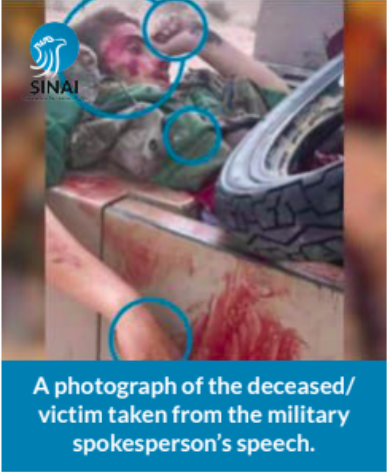
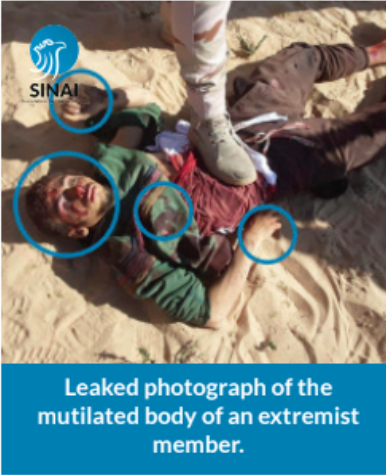
2. Pro- Egyptian-government militia and irregular armed groups abuses
Since the eruption of the conflict in Sinai 7 years ago, and its reaching unprecedented levels of violence, with continuing military operations by the Egyptian military against ISIS; the governmental authorities have informally resourced irregular armed groups from Sinai locals, who together were known as “Sinai Tribes Union”. it is an informal force that fights alongside the Egyptian army in the Sinai Peninsula, who were granted de facto power to carry out security operations, arbitrary arrest campaigns, and enforced disappearances. As a result of their lack of rigorous military training and lack of discipline and accountability, numerous serious abuses have been recorded, including extrajudicial killings. It is one of the conflicting parties that is governed by the law of war, that obliged everyone to do the maximum to maintain the safety of civilians, avoid involving them in the conflict, or attack them or decry their rights.
On 18.08.2020, an eyewitness from “Al-Sheikh Zwayed” told us that one of an irregular armed group that belongs to the “Sinai Tribes Union” who was accompanying an army patrol, had arbitrarily detained four women in “Bahbouh” neighborhood, southern “al-Shaikh Zwayed”. They later arrested another woman near the taxi parking, where she was waiting to take a ride to “al-Arish”. The women share the fact that they live alone without any family, as displaced from the next villages. The foundation team could not identify the detainees.
Another eyewitness reported to the foundation that the armed group was made up of three Toyota Cruze cars that made showoff tours in the city, starting from the center in “al-Arajeen” in “Abo-Tawila” village, and that they were accompanied by an army patrol. He added that the fifth woman (later arrested) was released two hours after the arrest, while nothing related to the rest of the women was known.
Abuses of the ISIS-affiliate group Wilayat Sinai’, or Sinai Province.
a. abducting civilians, thrusting them into conflict, and seizing their money.
“Sinai Foundation for Human Rights” followed up on the numerous abuses and brutal crimes against Sinai locals by ISIS-affiliate group Wilayat Sinai. The group is one of the active actors in Sinai’s conflict, and it practices an actual sporadic control over some northern areas of the peninsula, resulting in serious crimes against the locals, that includes extrajudicial executions, torture, and enforced disappearances. International laws impose on all conflict parties, including armed groups, the perseverance of the civilians and not drawing them into the conflict.
On 08.08.2020, members of ISIS abducted a number of civilians after they took control over “al-Ganayen”, “Qatia”, “Iqtiya” and “al-Marih” villages, among those abducted was “Ashraf Hasouna Abdullah Hasouna”, from “al-Ganayen”, claiming that he was in cooperation with the military. We spoke with a number of the civilian abductees’ families, and they all confirmed that their abducted relatives had no connection to the ongoing military operations, and that they feared for their relatives’ lives because ISIS elements often execute many of the civilians they abduct.
b. Bloody attacks in populated areas
The inhabitants of “Rabea”, “Qatia”, “Iqtiya”, “al-Marih” and “al-Ganayen”, in “Bir al-Abd” in North Sinai can not forget the terrible circumstances they’ve been in, and the brutal sights they’ve seen. As they witnessed a bloody attack Isis armed groups performed in the middle of the streets and alleyways of the populated villages, using weapons that produce massive explosive power that does not differentiate between civilians and military personnel, followed by clashes between the two parties, followed by an airstrike.
Province of Sinai group is considered to be one of the conflicting parties that badly harm civilians, as they do not hesitate to perform their brutal operations between civilian properties and inhabited areas. They have also aimed violence at the locals under false pretenses, which led many civilians to forcibly move into safer areas to preserve their lives.
The details of this incident that took place on 21.07.2020 are, members of the Province of Sinai group attacked an Egyptian military camp and security checkpoints in the village of “Rabea”. According to an eyewitness from the village who spoke with the “Sinai Foundation for Human Rights”, the attack near the houses and civilian areas started with two car bombs and an armed clash, that led to terrible losses in lives and properties.
“Sinai Foundation for Human Rights” researchers spoke with a number of “Rabea” village inhabitants. An eyewitness whose house, where he lives with his wife and children, is about 150 meters from the military camp said: “I was at home, and suddenly heard gunfire, then two consecutive explosions that caused the house to shake and the windows to break. I gathered my courage and carefully went out to see what had happened, and I saw people wearing half-military, half-civilian clothes, most of them masked, holding light weapons and running between the houses, shooting at the camp. Bullets were flying overhead from both directions. We got even more scared when we heard military aircrafts in the air. We know that aircraft interference means that whole houses would be flattened.”
A local citizen told the foundation’s field team: “My family and I were reciting the two Shahadas preparing for death at any moment due to the clashes and bombing. We were surrounded for close to an hour and a half where we felt like hostages. After it was all over, we went outside to see what happened. House and storefronts were destroyed. I learned after a while that some civilians were injured and that the village doctor is the one who aided them because the ambulance didn’t make it to the village, and they had to wait till the next morning to move them to “Bir al-Abd” hospital.
An owner of a store close to the military camp said: “The storefront was completely destroyed. Most of my belongings were damaged. The explosion and the following clashes destroyed more than ten stores and many cars.
A woman and a mother of a few children told us that she and her family moved from “Rabea” village to “Bir al-Abd” after the terrible experience they had been through. She added: “I thought that was the end. The sounds of explosions and gunshots and bombardment made us believe we were absolutely going to die. My kids and I hid in the kitchen, and the children were hysterically crying. It was a terrible experience I will never forget.”
Two eyewitnesses referred to the murder of a civilian called “Ashraf Salim Amir”, 52 years old, saying that he most likely was killed by ISIS members because he tried to stop them from going up one of the buildings to target the position of the armed forces. Some of the neighbors tried to help “Ashraf” by moving him, with great difficulty due to the clashes, to one of the village doctors. The doctor could not offer the needed help and advised them to immediately take him to a hospital. The ambulance could not get inside “Rabea” village till the first hours of Monday morning, where “Ashraf” bled out for ten hours till he took his last breath.
Subsequently, the Sinai Foundation for Human Rights received data from the General Hospital of “Bir al-Abd”, which revealed that the local human losses in the village of “Rabea” consisted of the killing of one person and the injury of three others, as follows:
Killing:
- Ashraf Amer Salim, 52 years old, was shot
Injury:
- Iman Nassar Salim, 19 years old, splinters to the head.
- Hala Mukbil hagras, 46 years old, a bullet to the thigh area.
- Eid Mohamed Eid, 33 years old, a bullet to the thigh.
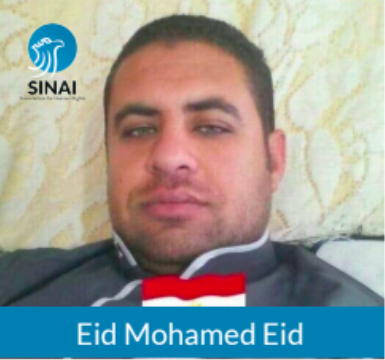
The report of the hospital and the official testimonies associated with it did not mention the reason for those shots or bullets, a usual practice that authorities used to apply to avoid official documentation, which prevents victims from getting fair compensation for the damages they suffered.
Consequences of ISIS attack on The village of “Rabea” camp
After carrying out their attack; they withdrew to the surroundings of the villages of Rabea; villages of “Qatia, ‘Iqtiya, al-Marih and al-Ganayen”, which are located in the south and southeast of the village where the attack occurred. They are all together inhibited by 8,895 people distributed to scattered houses and agricultural lands, where some of them were displaced from the villages of “Al-Sheikh Zwayed” and “Rafah” after the escalation of military clashes between ISIS and the army, or after their areas were exposed to random bombardment operations.
Around two hours after the attack, and during the withdrawal of ISIS elements from The village of “Rabea'', heading south; an eyewitness said that the war aircraft tracked a car carrying ISIS elements in the village of “al-Ganayen”. One of the village residents told the “Sinai Foundation for Human Rights”: “I saw a minivan with 5 gunmen entering the village, and they entered a house belonging to “Borhom Salem Hussien Ibrahim”. The house was empty as the residents were at their neighbors’ at that time. The gunmen saw the war aircraft that were still in the air, so they left the house trying to escape. At the same moment, the plane fired a missile that hit the car and a big part of the house was destroyed”. He added: ”Only one of the gunmen was injured, his companions carried him and withdrew towards the south. The foundation team knew for certain that the owners of the house were not contacted yet regarding possible compensation.
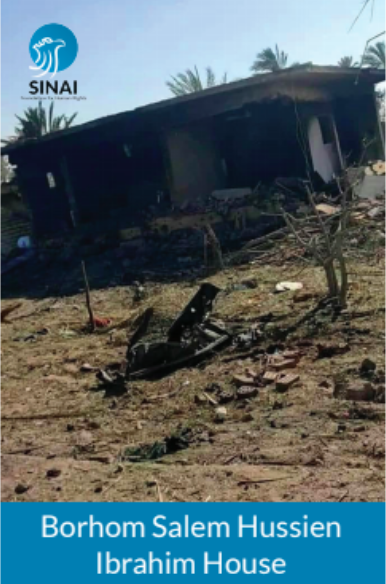
The residents of The village of “Qatia” were surprised with the spread of dozens of gunmen in the village in minivans, on motorcycles, and on foot, raising ISIS’s flag in the main square, and they sat up a field hospital inside the agricultural high school. An eyewitness told us: “They confiscated many cars owned by civilians, one of them is one of my family member’s cars, who is named “Sabah Mansour Nasr”. He was stopped by the gunmen and was forced to leave it. They used it for one hour before leaving it near the main square, and it was bombed later by an Unmanned aerial vehicle
A citizen who was forcibly displaced in 2015 from a village located to the south of Rafah, and lives now in the village of “Qatia” told us: “We had to leave The village of “Qatia” as well because of ISIS elements. They entered the village with cars and motorcycles, followed by war aircraft in the sky. We knew that we had an inescapable choice. We left quickly before the airstrikes began, and we left everything behind. We walked a distance of 3 km towards The village of “Rabea”. On the next day, I went back to bring the car and the livestock, but an ISIS member stopped me in my way and ordered me to give him the car keys. I begged him; it is my only source of support. He said it will be back after an hour and a half. They actually did but the floor of the backbox was covered in blood. I think they used it to transport their injured to a hospital. I tried to take the livestock, but they did not allow me to.”
More residents’ testimony revealed that ISIS elements tried to get closer to the locals. They asked them to choose either to leave the village or to stay and prepare themselves for hard times to come, they also offered to buy their livestock or to leave it with enough feed so they can take care of it. Those attempts had been fruitless, and most of the locals left the village out of fear for their lives, with the sour memory of what had happened to the residents of the villages of “Al-Sheikh Zwayed” and “Rafah” being hunted down, some of them being slaughtered after ISIS elements claimed that they were cooperating with the security forces.
The government’s role and relief efforts are out of the scene, as relief efforts were restricted to fulfilling the needs of the people displaced to nearby villages. A truck driver from the village of “Romanah'' told the “Sinai Foundation for Human Rights” that he helped with others in transporting residents of the village of “Rabea” and surrounding areas to safer places. He added that the government authorities did not offer any means of transportation for evacuation. He transported a family to their relatives in the village of “Gilbana'' and knew that they were displaced before from southern “Al-Sheikh Zwayed”
ISIS elements in Sinai burnt the ‘Iqtiya youth center, that was called “Shahid Ahmad al-Mansy” youth center. Eyewitnesses reported that they raised ISIS flag in front of the center then they took control of the medical supplies in the health unit of the two villages Qatia and ‘Iqtiya.
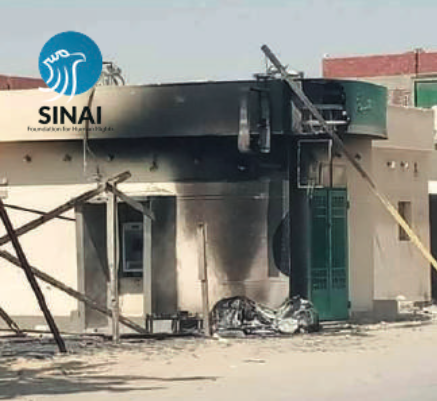
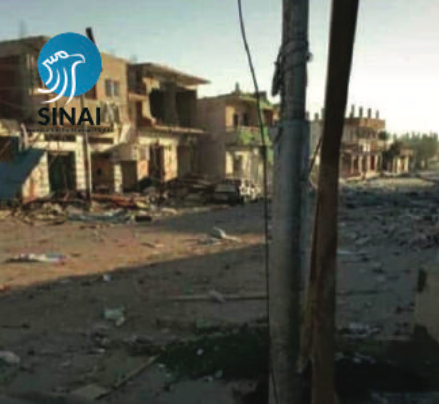
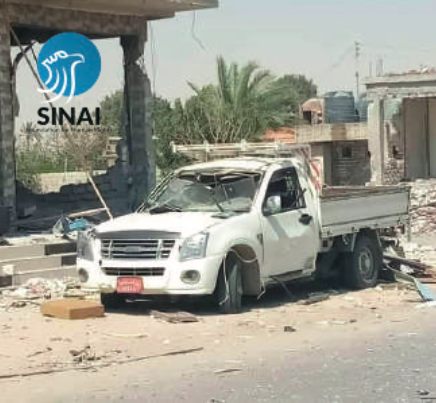
Health units, hospitals, and unofficial, non-security units are regarded as easy targets that are used by the conflicting parties to attack or destroy as a sign of dominance and to break the counterpart’s prestige, the thing that deepens the suffering of citizens. Customary International Law imposes the protection of health units, either during international or non-international armed conflict and according to the Geneva Convention additional protocol (II), 1977, Article 1-11, medical units and transports should be protected.
After 5 hard days for the people of Rabea, ‘Iqtia, Qatia, al-Marih and al-Ganayen, with a complete absence of governmental authorities; major - general “Mohamed Abdel-Fadhil Shusha”, the governor of “North Sinai” conducted a meeting at the headquarters of the General Diwan in “al-Arish”, about 130 km from the affected villages, resulting in forming a committee to limit the damages of residents’ properties, but the work was not processed due to the presence of ISIS elements in the referred to areas.
The government’s committee decision is not an encouraging one, and locals considered it as a way to neglect and overrule their rights. Locals always Sarcastically say: “if the government wants to bury a case, it will form a committee”. From previous experience, the people displaced in 2014 and beyond events from “Al-Sheikh Zwayed” and “Rafah”, have not received any compensation till that day.
---
Photos of Rabea events (Choose a few suitable ones)
---
Testimonies of forcibly displaced people due to The village of “Rabea” clashes:
“The Sinai Foundation for Human Rights” has followed a number of people evicted from those villages and interviewed some of them on 27.09.2020. A man in his mid-40s, displaced from the village of “al-Ganayen”, a subsidiary of “Bir al-Abd”, said that it has been more than 70 days and he has not yet arrived at his house. He is waiting for passersby to tell him the news about the abandoned villages. He is afraid of his savings running out, which he uses to pay the rent for his 5-member family, plus their basic daily needs of food and drink.
He once tried to visit his village during his displacement, after the news was circulated among the residents that entry was allowed, but they were prevented after the army troops that control the village gun-threatened them and fired shots in the air.
One of the farmers who were displaced from the village of “Qatia” to “Romanah” revealed to the “Sinai Foundation of Human Rights” how much he lost as a result of those events. He owns around 20 fruitful palm trees that will get dry if the army keeps preventing him from reaching them, and he will lose all the harvest. The date price per kilo costs around 10 EGP. If the season is over before he could reach his tress and his dates, he will have no money to spend on his family for an entire year.
Another farmer explained to the foundation how he and his family's suffering has doubled after his double displacement. He was first displaced from “Al-Sheikh Zwayed” to The village of ‘Iqtiya”, and rented a modest house after great suffering, to be displaced again to a hut made of palm-fronds within a group of them inhabited by plenty of displaced people living outside the village of “Gilbana”, subsidiary of Ismailia governorate. He lives with his four children and works in one of the close-by farms as a daily-paid farmer, with insufficient money. That hard situation prevents 2 of his children from attending school although they have already reached school age.
“Allah is all we’ve got! No one pays attention to us.”
For the designer: A Photo that shows the hut that is used in Sinai.
Two other displaced persons who live in the village of “Romanah”, subsidiary of “Bir al-Abd”, one coming from Rafah and the other from The village of “Qatia”, say that although the distance between the two areas is more than 100 km, the suffering and the reasons that led them to this situation are the same. The first one was displaced from “Rafah”, then the military operations and armed conflict between the army forces and ISIS elements reached the village of “Qatia”.
The 60-year-old man displaced from “Rafah” said: “We left thousands of fruitful feddans behind. Our houses were destroyed, and we are now begging for help. We wished to not see our suffering repeat with others, but here we are. We are all in the same situation”. He added: “They enjoy making our lives harder, as if we, the people of Sinai, should be punished for others' mistakes. We are asked to die in silence while the silliest of topics are at the forefront of the media attention.”
A 55-year-old woman displaced from the village of “al-Marih”, who ended up with her family in one of the huts on the outskirts of “Al-Romanah” village told us that she is worried about the birds she used to breed in her house, and she can't wait to get back to them, as its her only source of income after her husband passed away leaving her with two daughters and a son who all work as daily-paid farmers. She assured us that she hasn’t received any government assistance, whether as food or financial aid.
Extrajudicial Killings
“Sinai Foundation for Human Rights” has tracked ISIS’s armed units’ severe crimes against civilians. The "Sinai State" group is considered to be one of the parties which carry out severe violent acts towards the local residents, and extrajudicial executions are repeatedly used by ISIS as a consistent method of retaliation, intimidation, abuse, or military gain fulfillment. As one of the bloody armed conflict parties in Sinai, it is required by international humanitarian law to differentiate between civilians and fighters, this is an essential principle that remains in effect regardless of the nature of the conflict and its parties, and this is confirmed by article 48 of the additional protocol (1) to the Geneva convention, 1977.
The First Incident
On the early morning of 04.07.2020, an armed group snuck into the village of “al-Goura”, about 7 kilometers south of “al-Sheikh Zwayed” center, and murdered 3 of its residents, the customary judge “Salama Abu-Maiouf Al-Baly”, 58 years old, real estate tax employee “Mahmoud Mohamed Khedir Salman”, 54 years old and his son, a high school student, and the Fajr prayer imam in the village's main mosque, “Mohamed”, 16 years old.
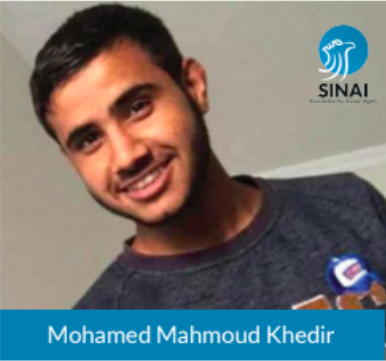
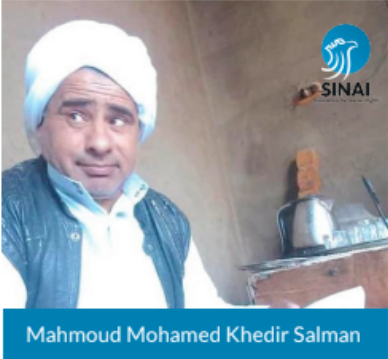
An eyewitness told “Sinai Foundation for Human Rights” that masked people with machine guns, probably belonging to ISIS, surrounded Salama's home and opened fire, women's screams brought neighbors and other residents to the judge’s home, among them were Mahmoud and his son Mohamed, they were killed immediately.
One of the village's youths who tried to help the victims told us that the reason the customary judge's home was targeted was due to one of his sons' cooperation with security forces against ISIS, and that the accountant and his son were unarmed civilians, and that they tried to save the judge and prevent the assailants from killing him. Another 4 civilians confirmed to us that the victims were civilians and had never belonged to any armed groups.
Regarding the role of security forces in the village of “al-Goura”, eyewitnesses among the local residents confirmed to us that they were negligent in their duties and responding to cries for help from the locals once the armed group entered, as they had conditioned that participation would be in the form of "randomly spraying the village with bullets" which the residents refused due to the human losses that could result from that.
Residents of the village explained that the families are who transported the victims' bodies to “al-Sheikh Zwayed” hospital on a local pickup truck, then to the “al-Arish” Hospital, because no ambulance made it to the area, then they were buried in a neighboring village's cemetery, 3 days after the fact.
One of the people at the funeral spoke to Sinai Foundation for Human Rights, he said that the scene was very sad, Mohamed, the murdered youth, was well known in the village for his good conduct and his role in the village's main mosque, and that the day of the attack, he had been preparing to take the Azhar high school examination in front of a panel at “al-Sheikh Zwayed”.
The Second Incident
In another incident that took place on 06.07.2020, locals of the village of “Abu-Tawila”, subsidiary of “Al-Sheikh Zwayed” found a head without a body. The head belonged to “Eid Jum'a El-Argany”, 47 years old, brother to the businessman “Ibrahim Jum'a El-Argany”, who is a supporter of Sinai Tribes, which works with the official support of the security forces to fight ISIS elements in Sinai.
“Sinai Foundation for Human Rights” spoke with 2 of the victim's relatives, as well as 3 of the village residents, all accounts agreed that “Eid Al-Aragany” was abducted from his farm at “Abu-Tawila”, and hours later his head was found near “al-makrafy” Mosque, and that he did not belong to Sinai Tribes, nor did he carry a weapon. Field sources agreed that there was no clear reason for his murder but suggested that the reason was likely his close relationship with his brother.
The facts of the crime show that the perpetrator was likely ISIS in Sinai, which regularly carries out killings in such a manner. And according to tens of prior cases, the victims of which were civilians, the method of slaughtering the victims then only disposing of the body, or the body without the head, or disposing of each in a different area, is an act particular to the brutal group to punish those who it deems as enemies. These are organized crimes carried out on a systematic and constant basis against civilians, such as intentional and extrajudicial killings, which amounts to crimes against humanity in accordance with the International Humanitarian Law.
Destruction of civilian objects
International humanitarian law protects civilian objects, as it is stated in article 52 of the first extra protocol of the 1977 Geneva Convention that public properties are not to be used as a target for attacks, nor deterrent attack. It also described civilian objects as any non-military objects, while article 53 of the same document pointed out the necessity of protecting cultural objects, places of worship, and historical monuments, and prohibited committing hostilities against them in light of their importance for forming cultural or spiritual heritage for peoples.
On 22.07.2020 Sinai State group elements partially burned and destroyed the village of “Iqtiya” youth center, as well as blasting the shrine of “al-Sheikh Abu-Ketan”, a non-significant shrine in the village of “Iqtiya”. The Sheikh himself has no spiritual value, nor does he have followers, according to statements by 2 eyewitnesses who spoke with Sinai Foundation for Human Rights.
ISIS has committed similar acts before, including blasting the “Al-Sheikh Zwayed” shrine in the city, attacking the “Shamea” and “Soubeha” shrines in 2016 in the Mazar village west of “al-Arish”, as well as abducting several Soufi symbols in 2017, executing some and slaughtering others.
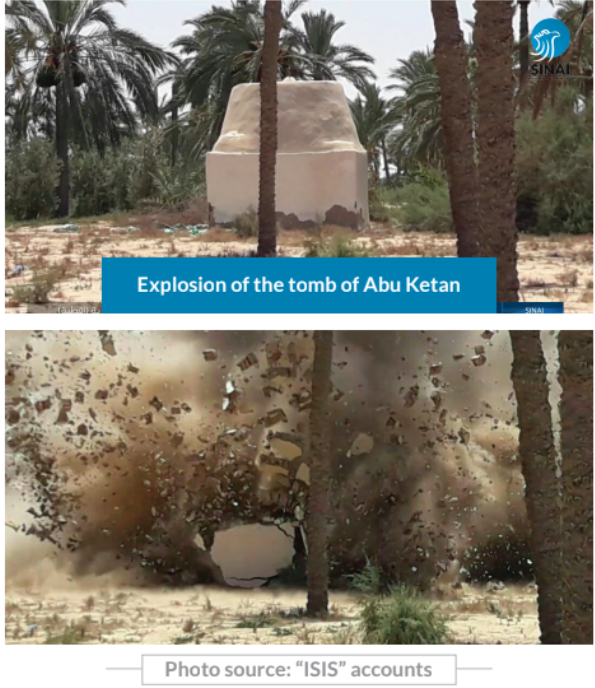
a. Taking cover in Civilian properties
We mentioned earlier in this report that using civilian properties such as homes, schools, or places of worship is prohibited according to customary humanitarian law, and it provides clear protections that prevent the targeting of these objects with attacks that may lead to their total or partial destruction. These prohibitions include all parties including irregular armed groups.
On 17.08.2020 an airstrike attack on “Al-Rahma” mosque in the village of “Iqtiya”, subsidiary of “Bir al-Abd” was uncovered. Two eyewitnesses told “Sinai Foundation for Human Rights” that on the 13th of August the village witnessed an army airstrike targeting the mosque, which was empty of civilian worshipers. And eyewitnesses from the village reported to us that ISIS elements started the call for prayer and holding prayer inside the mosques after they had taken control over the village, which led to the Egyptian army's airstrike targeting the mosque.
b. Random Attacks that Do Not Differentiate Targets
International humanitarian law devotes many principles for conflicting parties to not target or endanger civilians, as well as prohibiting randomly targeted attacks and weaponry that does not differentiate between civilians and military targets, including explosive devices and landmines, and that's in accordance with article 4/51 of the additional protocol (1) to the Geneva convention, 1977. On 26.07.2020, a medical source and eyewitnesses revealed to “Sinai Foundation for Human Rights” the injury of 3 civilians, one of whom was a child, with different injuries caused by a leftover explosive device from ISIS's attack on the 21st of July near an army camp in the village of “Rabea”.
The injured were:
1- Ahmad Mohamed Mutab, 9 years old.
2- Ashraf al-Sayed al-Hadaq, 27 years old.
3- Sameh al-Sayed al-Hadaq, 24 years old.
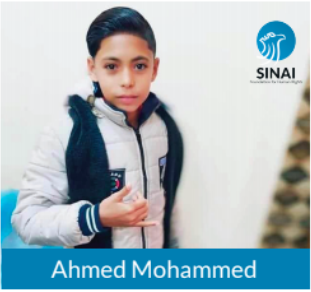
c. Attacks Where Civilian Property Was Used
Armed conflict laws, treaties, and customary laws emphasize the necessity of not using civilian objects, including civilian transportation methods, in conflicts as to not turn them into military targets, articles 48 and 52 of the additional protocol (1) to the Geneva convention, 1977, are a prime example in clarifying interaction with civilian objects and not using them as military fronts by conflicting parties.
On 29.08.2020, ISIS in Sinai executed a suicide bombing by means of a car bomb that targeted an army congregation in The village of “Qatia”, subsidiary of “Bir al-Abd”, according to what was published by the group's media. The suicide terrorist used a car that belonged to an abducted civilian named “Mohamed Hassan Shabana”, whose kidnapping was documented by Sinai Foundation for Human Rights on the 24th of July 2020.
ISIS does not shy away from attacking civilians when they exist near one of its military targets in Sinai or using civilian objects as tools in its bloody conflict with the Egyptian army, it has also shown in many instances to take civilian owned property and use it in its conflict.
Recommendations:
1. To the Egyptian government
a. Conducting transparent investigations into incidents elements of the military and security forces are part of that led to civilian casualties and damages to civilian properties, followed by fair prosecution of security and armed forces personnel involved in the abuses.
b. Judicial supervision should extend to cover all security procedures, which dictates the amendment of the state of emergency, to demolish unchecked and non-constitutional power given to law enforcement forces.
c. Creating a compensation mechanism suitable for those affected by the forced eviction and internal displacement campaigns, and offering appropriate alternatives, and ensuring the lack of discrimination in granting their rights.
d. Adhering to International Humanitarian Law principles by the military personnel and security forces is an important basis that includes professionalism in doing their jobs. Educating and training soldiers and officers on these rules through curricula at the military academy and other training courses is also a must.
e. Lifting unlawful and discriminatory restrictions on commercial, fishing, and transportation activities in Sinai, and offering immediate and fair compensation to civilians affected by them.
f. Performing adjustments on the laws and regulations that allow vast, unrestricted power to the security and armed forces, including the state of emergency and anti-terrorism legislation, and putting in place mechanisms that ensure judicial and legal oversight on the law-enforcement authorities.
g. Inviting and accepting requests for visits by UN Special Procedure mechanisms to Sinai, granting them unhindered access, and ensuring that no reprisal is to befall those who cooperate with them.
2. To all conflicting sides, including militants of “ISIS affiliate, the Sinai Province”
a. Taking all possible precautions for protecting civilians, in accordance with the International Humanitarian Law, during any land or air raids.
b. In areas where the unlawful side to the conflict is the ruling force, all necessary precautions are to be taken to protect the rights of all inhabitants without discrimination and ensure all basic needs of civilians.
Related Postes
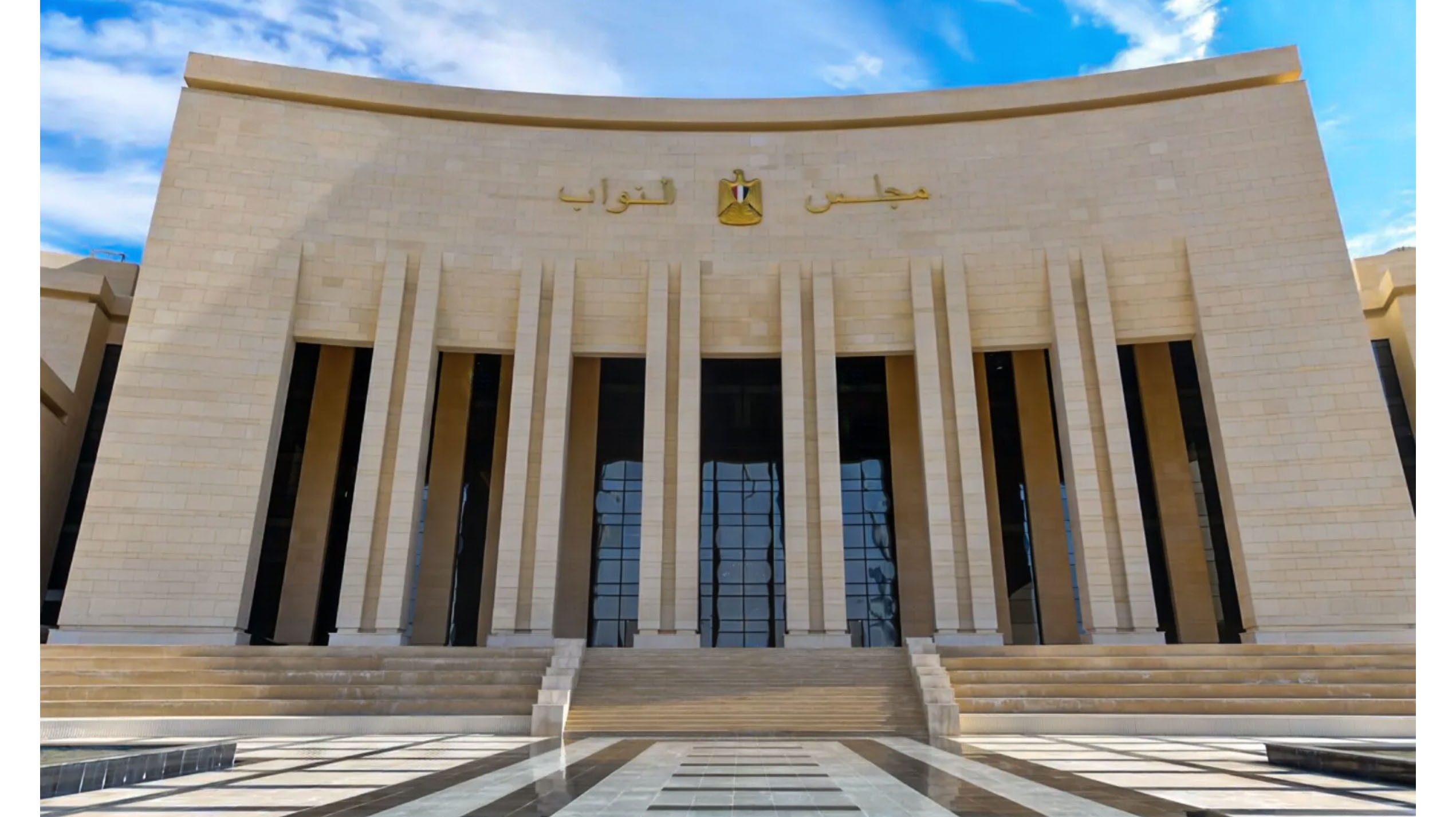 English content
English content

